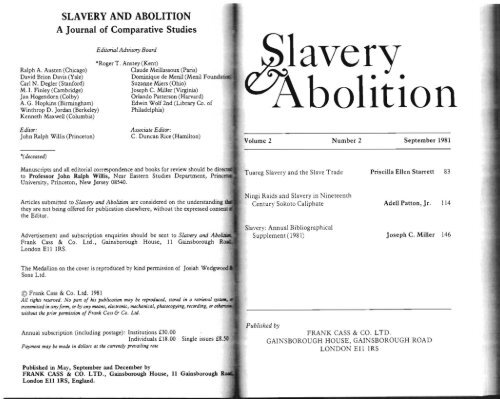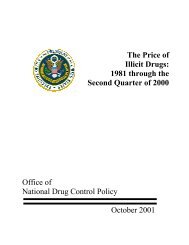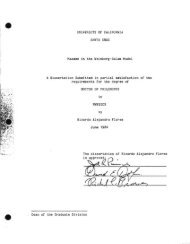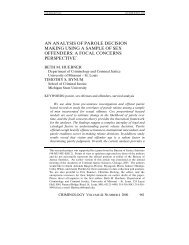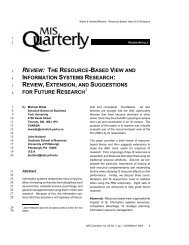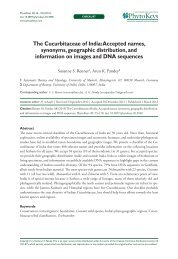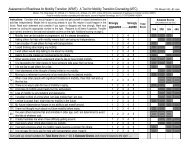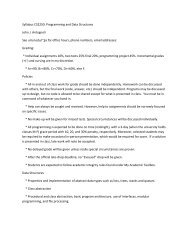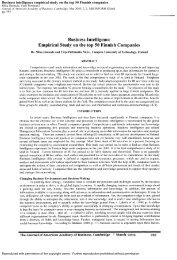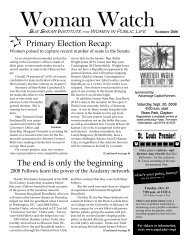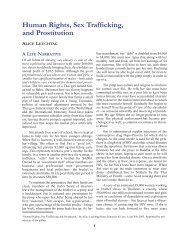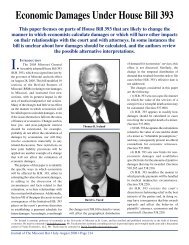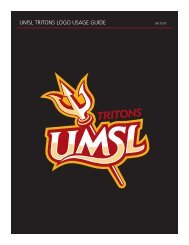Ningi Raids and Slavery in Nineteenth Century Sokoto Caliphate
Ningi Raids and Slavery in Nineteenth Century Sokoto Caliphate
Ningi Raids and Slavery in Nineteenth Century Sokoto Caliphate
You also want an ePaper? Increase the reach of your titles
YUMPU automatically turns print PDFs into web optimized ePapers that Google loves.
SLAVERY AND ABOLITION <br />
A Journal of Comparative Studies <br />
Edilorial Advisory Boord<br />
· RogerT. Anstey (Kent)<br />
Ralph A. Austen (Chicago)<br />
Claude Meillassoux (Paris)<br />
David Brion Davis (Yale)<br />
Domiltique de Menil (Menil ~O'LIlmllllllll<br />
Carl N. Degler (Stanford)<br />
Suzanne Miers (Ohio)<br />
M.1. F<strong>in</strong>ley (Cambridge)<br />
Joseph C. Miller (Virg<strong>in</strong>ia) <br />
Jan Hogendorn (Colby)<br />
Orl<strong>and</strong>o Patterson (Harvard) <br />
A. G. Hopk<strong>in</strong>s (Birm<strong>in</strong>gham) Edw<strong>in</strong> Wolf 2nd (Library Co. of <br />
W<strong>in</strong>throp D. Jordan (Berkeley)<br />
Philadelphia) <br />
Kenneth Maxwell (Columbia) <br />
Ion <br />
Edit"':<br />
John Ralph Willis (Pr<strong>in</strong>ceton)<br />
.( deceased)<br />
Associate Ediwr: <br />
C. Duncan Rice (Hamilton) <br />
Volume 2 Number 2 September 1981<br />
Manuscripts <strong>and</strong> all editorial correspondence <strong>and</strong> books for review should be<br />
(0 Professor John Ralph Willis, Near Eastern Studies Department, Pr<strong>in</strong>ce.<br />
University , Pr<strong>in</strong>ceton, New Jersey 08540.<br />
Articles submiued [0 <strong>Slavery</strong> <strong>and</strong> Abolilion are considered 0t:\ the underst<strong>and</strong><strong>in</strong>g<br />
they are not be<strong>in</strong>g offered for publication elsewhere, without the expressed cOlosenll<br />
the Editor.<br />
Advertisement <strong>and</strong> SUbscription enquiries should be sent to <strong>Slavery</strong> <strong>and</strong> IIbol"'",<br />
Frank Cass & Co. Ltd., Ga<strong>in</strong>sborough House, II Ga<strong>in</strong>sborough<br />
London Ell IRS.<br />
Tuareg <strong>Slavery</strong> <strong>and</strong> the Slave Trade Priscilla Elle n Starrett 83<br />
~<strong>in</strong> gi <strong>Raids</strong> <strong>and</strong> Slave ry <strong>in</strong> N<strong>in</strong>eteenth<br />
Centu ry <strong>Sokoto</strong> Ca liphate Adell Patton, Jr. 114<br />
<strong>Slavery</strong>: Annual Bibliographical<br />
Supplement (198 1) Joseph C. Miller 146<br />
The Medallion on the COVel" is reproduced by k<strong>in</strong>d perm.ission of Josiah W"dgwoocU<br />
Sons Ltd.<br />
© Frank Cass & Co. Ltd. 1981<br />
All rigllt! ,eseroed. No parr of his publication may be reprodU4ed. siored <strong>in</strong> 0 retrieval sysu..<br />
lJ'anmliJt~d <strong>in</strong> anyfarm. or by any ,"eal'lJ. eUclJ'onic. rMchonicoJ. phalocopy<strong>in</strong>g. record<strong>in</strong>g. or<br />
without tlu pn·or permissicm of Frank Call & Co. Lui.<br />
Annual subscription (<strong>in</strong>clud<strong>in</strong>g postage): Institutions £30 .00<br />
Individuals £18 .00<br />
P aymull. may be mode <strong>in</strong> dollars at tM cllrmuly prevail<strong>in</strong>g rau<br />
S<strong>in</strong>gle issues £8. SO<br />
Published by<br />
FRANK CASS & CO. LTD. <br />
GAINS BOROUGH HOUSE, GAINSBOROUGH ROAD <br />
LONDON Ell IRS <br />
Published <strong>in</strong> May, September <strong>and</strong> December by<br />
FRANK CASS & CO. LTD., Ga<strong>in</strong>sborough House, II Ga<strong>in</strong>sborough<br />
London Ell IRS, Engl<strong>and</strong>.
<strong>N<strong>in</strong>gi</strong> <strong>Raids</strong> <strong>and</strong> <strong>Slavery</strong> <strong>in</strong> <br />
N<strong>in</strong>eteenth <strong>Century</strong> Sakata <strong>Caliphate</strong> <br />
Adell Patton, Jr. *<br />
\,INGI RAIDS AND SLAVERY<br />
1J5<br />
Introduction<br />
<strong>N<strong>in</strong>gi</strong> territory is located <strong>in</strong> (he eastern region of Nigerian Hausal<strong>and</strong> at the<br />
nonhernmost end of [he Jos Plateau massif. From remote rimes <strong>in</strong>to the<br />
n<strong>in</strong>eteenth century numerous small scale patril<strong>in</strong>eal <strong>and</strong> heterogenous<br />
societies scaled <strong>in</strong>to this frontier region; these societies consisted of the<br />
Butawa, N<strong>in</strong>gaw3, Chamaw3, Basaw3, Warjawa, Sirawa <strong>and</strong> Pa 'awa. By<br />
1846 the population movements <strong>in</strong>to this region occupied the major<br />
escarpments. Dissident Kana Hausa mallamai (religious practitioners <strong>and</strong><br />
teachers) scttled the area last j organized the acephalous non-Muslim mounta<strong>in</strong>eer<br />
societies ima revolt aga<strong>in</strong>st the Sakata <strong>Caliphate</strong> ; <strong>and</strong> founded the<br />
<strong>N<strong>in</strong>gi</strong> Chi efdom ca. 1847. The N <strong>in</strong>gi resisted successfull y the emirates of<br />
Bauchi, Kano, Zazzau, <strong>and</strong> many others. This paper highlights the N<strong>in</strong>g:<br />
raid<strong>in</strong>g strategy agai nst the imposition of Soko[Q rule <strong>in</strong> the n<strong>in</strong>eteentl:<br />
cenrury. '<br />
Pre-chiefdom era <strong>and</strong> Kano Imperialism<br />
0<br />
.,<br />
'"<br />
v<br />
..<br />
v,' ,,<br />
,<br />
,--<br />
, ,---- ... ........<br />
" <br />
", . ", :<br />
..... r .... ,',<br />
....J.. \ .. )<br />
, ,,<br />
In the pre-chiefdom era, most of [he stateless societies were the target o!<br />
slave raiders. Mixed success marked th e military strategy of the mounta<strong>in</strong>eers<br />
aga<strong>in</strong>st centralized forces. With the help of smiths, who made iroa<br />
equipmem, provision<strong>in</strong>g of war materiels became available. And based OIl<br />
observations of plateau ecology, it is possible to extrapolate the reconstruction<br />
of military s trategy, which was to set camp <strong>in</strong> the vic<strong>in</strong>ity of the<br />
mounta<strong>in</strong>eers. In a procedural manner, envoys were sem <strong>in</strong> the first Sla e<br />
with tribute dem<strong>and</strong>s usually [or slaves needed <strong>in</strong> a variety of capacities. 1;'<br />
the mounta<strong>in</strong>eers deci ded (Q yield to the dem<strong>and</strong>s, there was no wa r bur K<br />
the cont rary, once the Tsafi chiefs <strong>and</strong> elders made the decision to fight , t.he<br />
hill guerilla cont<strong>in</strong>gems met the oncom<strong>in</strong>g mixed forces with shower<strong>in</strong>E<br />
arrows, rocks, <strong>and</strong> other items of weaponry at the edge of the hills, Wh<br />
these materiels ran out, the hill warriors then retreated to the successi,"-:<br />
wave of hills with pursu<strong>in</strong>g enemy forces where they repeated the strategy<br />
Walls of rock served as barriers aga<strong>in</strong>st enemy penetration, <strong>and</strong> pebble:..<br />
hun the unshod horses' hoofs. Once the pla<strong>in</strong>s cavalrymen climbed dowt.<br />
the hills aga<strong>in</strong>st oncom<strong>in</strong>g boulders <strong>and</strong> arrows, they were at cont<strong>in</strong>ui.<br />
I Depanment of History. Howard Universi ty<br />
~<br />
,<br />
-......_...-'-"<br />
, I<br />
I<br />
,./,'
"INGI RAIDS AN D SLAVERY<br />
116 SLAVER Y AND ABOLITIOK<br />
117<br />
disad vantage aga<strong>in</strong>st the mounta<strong>in</strong>eers. Wirh these facto rs <strong>in</strong> m<strong>in</strong>d, cen·<br />
traliz<strong>in</strong>g <strong>in</strong> vad<strong>in</strong>g fo rces ofreo pu rsued a wait<strong>in</strong>g st rategy jn effort s, to s ta~e<br />
the people who would then come down <strong>in</strong> sub mission. Sometlmes (hu<br />
slralegy worked <strong>and</strong> al olher limes il did not. The hill dwellers oflen localed<br />
their granaries on isolated hill tops, <strong>and</strong> aged women <strong>and</strong> children were<br />
hidden <strong>in</strong> hill va lleys some dislance away from the scenes of ballie.<br />
Evid ence of warfare between the mounta<strong>in</strong>eers <strong>and</strong> Kana imperialism<br />
app eared as far back as the founeenth <strong>and</strong> early fi fteenth cemuries. Ya ji wa~<br />
lhe eleventh Sarki who reigned dur<strong>in</strong>g the years AD 1349-1385. In efforts ar<br />
consolidation he moved his capital about <strong>and</strong> reigned at Bunu for twO<br />
,<br />
years<br />
. .<br />
<strong>in</strong> Rano. Yaji moved later to Kur which brought him <strong>in</strong> close contact WILD<br />
[he Warjawa ("Worjawa lO ) <strong>and</strong> other transhumant m o untai~ ee r s. :h~<br />
probable acquisilion of horses by Yaji may have lurned th e llde agalns;:<br />
dwellers of dual ecology for he made war wilh Warji <strong>and</strong> remamed lhere fo:<br />
some time. In time the praise song about the eleventh Sarki yielded clues (g<br />
the grow<strong>in</strong>g power of Kano aga<strong>in</strong>st the mountai n societies: "Yaj i, conqueror<br />
of the rocky heigh (s , scattered hos ts, lord of the ~ own ." Th e . s ~hjuga<br />
tion of Santolo opened the way for cont<strong>in</strong>ual cont::tc t With t~e~e sOCletla<br />
south westerly of Kana. However J the prowess of these SOCIeti eS causcG<br />
<strong>in</strong>novalion <strong>in</strong> K ano armor. K anajeji , th e lh<strong>in</strong>eenth Sarkl AD 1390-1410<br />
was the first Hausa chief to <strong>in</strong>troduce "Lifi di" or gild ed armor to prOlect the:<br />
horses iron helmels <strong>and</strong> flexible coals of armor lO prolecl the bod y. H~<br />
made <strong>in</strong>nova " tions because of heavy losses suffered <strong>in</strong> the war agalO . St tG= .<br />
Butaw3 (U mbaw ). It is said that Kanaje ji returned aga <strong>in</strong> to make wr<br />
aga<strong>in</strong>st the Butawa but wi thout success. N ot given to defea t., he came<br />
BelU <strong>and</strong> stayed for two years, <strong>and</strong> be<strong>in</strong>g unabl e to till the soil , he star \"<br />
oUl the people, <strong>and</strong> lhey agreed lO his dem<strong>and</strong>s of 1,000 male <strong>and</strong> I ,<br />
female slaves plus children . Kanajeji granled a lOlal peace when lhey ga'%<br />
anolher 2,000 slaves. This sizable d emographic loss from th e BUlawa ranb<br />
caused considerable structural weaknesses."! . . ..<br />
The strategy of uncoord<strong>in</strong>ated frontier raiders aga <strong>in</strong>st mountalO ~oc l ellO<br />
contrasted vividl y with raids of centralized states <strong>in</strong> efforts to ob tam sla\"C5<br />
<strong>and</strong> booty, Stanhope White provides an i nt er es ~<strong>in</strong>g accou ~ t about •<br />
effect iveness of this general strategy for reconstruction. T he ral ~e rs campa:.<br />
with their horses some distance away from the planned area of ptllage on tht<br />
previous nighr for the dawn attack. A cont<strong>in</strong>gent with horses arri ved at dK.<br />
fOO L-hill shorlly before dawn . Then, rhe foolmen moved forward =<br />
surrounded as many of the lowest situated houses as possible; the horsemen<br />
who were lefl beh<strong>in</strong>d, would come charg<strong>in</strong>g forward al d ay break •<br />
carr; away capti ves <strong>and</strong> cover the retreat. The perfec tion of thi s pla.n oft!:!<br />
failed because of a bark<strong>in</strong>g dog or a sleepless man <strong>and</strong> before lhey IOV
118<br />
SLAVERY AND ABOLITION<br />
NINGI RAIDS AND SLAVERY 119<br />
the case of the non-Muslim population of <strong>N<strong>in</strong>gi</strong> is not entirely clear.<br />
H owever I oral versions of the mounta<strong>in</strong>eers hold that the <strong>Caliphate</strong> applied<br />
the "spoils of war" policy 10 them . To the contrary , from their po<strong>in</strong>t of<br />
view, they def<strong>in</strong>ed this idiomatically as Kila KWQlIdo, a process of be<strong>in</strong>g<br />
forced to do an undesired ac(. Zazzau lore described it as Bani-Balli . The<br />
Pa'awa say that they left Bauchi because the Emir Ya'qub used to send his<br />
reta<strong>in</strong>ers (fadawa) to raid their homes <strong>and</strong> enslave members of their<br />
fa milies; cattle <strong>and</strong> animals were also spoils <strong>in</strong> these raids. Boys wefe often<br />
required t Q com e [Q Bauchi <strong>and</strong> repair the wa ll s of the city. There is a<br />
consensus all over N <strong>in</strong>gi today that Kila Kw<strong>and</strong>o was a reality <strong>in</strong> the period<br />
under stu dy .!~<br />
In 185 5 , forexamplc, Dr Eduard Vogel was <strong>in</strong> Bauchi <strong>and</strong> witnessed the<br />
exploitative practices, which supports the oral tradition. In a long letter, Dr<br />
Vogel described the system of catch<strong>in</strong>g slaves. The non-Muslims affected<br />
resided <strong>in</strong> the frontier regions of Bauchi <strong>and</strong> Zazzau, <strong>and</strong> located their<br />
villages on lOp of the highest rocks. With a large military force the Sultan<br />
occupied the fields <strong>in</strong> the va lleys; his horses trampled the green harvest; <strong>and</strong><br />
<strong>in</strong> fear of star vation, the <strong>in</strong>habitanrs sent down the number of boys<br />
dem<strong>and</strong>ed . With<strong>in</strong> three weeks, two hundred slaves <strong>in</strong> excellent conditior:<br />
went to Sokoro for sa le. S<strong>in</strong>ce the Butawa ofDua agreed to tribute dem<strong>and</strong>s.<br />
Kifa Kwa"do did not affect them. '"<br />
Although future research may lead to the contrary, presently one is<br />
without success <strong>in</strong> attempt<strong>in</strong>g to establish a chronology for slave raid5<br />
aga<strong>in</strong>st the <strong>N<strong>in</strong>gi</strong>. This difficulty may be due to the widespread use of slave;<br />
<strong>in</strong> the economic Structure of Kano <strong>and</strong> the d irection of the export trade_<br />
These con:)iderati ons explai n <strong>in</strong> part why K oelle's l<strong>in</strong>guisti c <strong>in</strong>ventory of<br />
1849 <strong>in</strong> Sierra Leone conta<strong>in</strong>s no refere nces to n arrations of slaves from<br />
<strong>N<strong>in</strong>gi</strong> <strong>and</strong> does not provide clues to thc tim<strong>in</strong>g of the raids. ll It must not bt:<br />
ruled out that <strong>N<strong>in</strong>gi</strong> slaves were present but K oelle did not <strong>in</strong>terview the.lll<br />
In Hausal<strong>and</strong> clan leaders or pr<strong>in</strong>ces ga<strong>in</strong>ed power through the control r1.<br />
the trade <strong>in</strong> captives dur<strong>in</strong>g the course of the n<strong>in</strong>eteenth cemury, whicia<br />
came to form a sizable <strong>in</strong>vestment. Slaves performed various functions,U<br />
<strong>and</strong> accord<strong>in</strong>g to Barth, they al most equaled the free popularion <strong>in</strong> K ano. r :<br />
The Kano aristocracy employed some slaves as domestics; o thers worked <strong>in</strong><br />
the agricultural estates,ld two of which were between K ano <strong>and</strong> N<strong>in</strong>g:t ~<br />
Lajawal ( Easr oLK ano near Gaya), Nafara (East of Kano near Dutse) ani<br />
Gurjiya (South of Kano) ;15 still more slaves went as p resents to marrie.:<br />
d aughters, wives, sons or less fortunate relations; <strong>and</strong> others were<br />
exchanged for f<strong>in</strong>ancial considerations.<br />
Dur<strong>in</strong>g the course of the century, the <strong>in</strong>flation of the cowrie currency rose<br />
to a po<strong>in</strong>t which made for difficult transport as a medium of trade. Captives<br />
were highly valued <strong>and</strong> by be<strong>in</strong>g mobile they carried other items; <strong>in</strong> thi><br />
role, they served as multiple currencies. III Barth noted the difficulty t!:<br />
determ<strong>in</strong><strong>in</strong>g the number of slaves exported <strong>in</strong> the slave-trade but h=<br />
observed that small caravans carried the largest number to Borno <strong>and</strong> Nupe<br />
rather than 10 Ghat <strong>and</strong> F ezzan." But the successful N<strong>in</strong>g i rebellion cut off<br />
the supply of slaves from that region which had figured so prom<strong>in</strong>ently <strong>in</strong><br />
lspects of <strong>in</strong>creased <strong>in</strong>ternal revenue to rhe <strong>Caliphate</strong> .<br />
Resistance aod P olitical Change<br />
In ca. ] 847 the rise of the <strong>N<strong>in</strong>gi</strong> predatory state altered the exist<strong>in</strong>g tributary<br />
relationships among the mounta<strong>in</strong> people <strong>and</strong> Cali p hate. Changes <strong>in</strong> politi.<br />
""I scale brought more people <strong>in</strong>to a closer relationship. In the absence of<br />
abundant natural resources for possible control by the mallamai , cleavages<br />
m status <strong>and</strong> wealth were slow to emerge, <strong>and</strong> the <strong>in</strong>digenous hierarchy of<br />
;ijffu sed roles offered the mallamai new opportunities for leadership.<br />
_\lthough dissident Muslims later jo<strong>in</strong>ed them from adjacent emirates,<br />
llong with o ther outcasts <strong>and</strong> soldiers of fortune, they did so only after the<br />
~·enture's success on the frontier was evideD(. Any opportunities Ihar arose<br />
ere by·products of changes <strong>in</strong> <strong>Caliphate</strong> adm<strong>in</strong>istration <strong>and</strong> Islamic ideol<br />
:gy.<br />
The resistance aga<strong>in</strong>st the <strong>Caliphate</strong> lOok on a variety of forms <strong>and</strong> stages:<br />
Hausa mal/arnoi at Tsakuwa vis-a-vis the K ano Emirate; H ausa mallamai <strong>in</strong><br />
~ueat <strong>and</strong> vis-a-vis the m ounta<strong>in</strong>eers of <strong>N<strong>in</strong>gi</strong> <strong>and</strong> the united effort of the<br />
::.:cple led by the mallamai vis-a-vis Bauchi Emirate <strong>and</strong> <strong>in</strong> self-defensc. As<br />
tters turned Out, two types of resistance developed: resistance to aggreslion<br />
<strong>and</strong> , further ) resistance to established rule. In <strong>N<strong>in</strong>gi</strong> resistance to<br />
- koto, the Hausa mallamai were outside the Community of Islam <strong>and</strong> <strong>in</strong><br />
«'lhodox term<strong>in</strong>ology, th ey were apostates. lfI However, th e mallamai themselves<br />
did not reject Islam, <strong>and</strong> rhey cont<strong>in</strong>ued to perform their religious<br />
~ ligations even <strong>in</strong> resistance.<br />
The mallamai experienced a number of <strong>in</strong>ternal <strong>and</strong> external changes<br />
_mng their efforts at consolidation <strong>in</strong> <strong>N<strong>in</strong>gi</strong>, <strong>and</strong> questions of survival <strong>and</strong><br />
selection of leadership <strong>in</strong> the develop<strong>in</strong>g tradition of resistance to em pire<br />
acrupied them . Several wars <strong>and</strong> numerOus <strong>in</strong>cursions followed <strong>in</strong> the<br />
ermath of reorganization aga<strong>in</strong>st Muslims <strong>and</strong> non-Muslims alike. The<br />
Ciliphate's concern about these raids was shown by its united retaliatory<br />
.&:tion aga<strong>in</strong>st <strong>N<strong>in</strong>gi</strong>. A reconstruction of some <strong>N<strong>in</strong>gi</strong> raids reflects chang<strong>in</strong>g<br />
Q"ategy <strong>and</strong> military <strong>in</strong>novation <strong>in</strong> the growth of offices . The far flung<br />
rnetration of the forays <strong>in</strong>dicates the role of external alliances with lllgi,<br />
E>d <strong>N<strong>in</strong>gi</strong> leaders' <strong>in</strong>creased confidence.<br />
The strategy of the <strong>N<strong>in</strong>gi</strong> raid<strong>in</strong>g style began dur<strong>in</strong>g the reign of Malam<br />
u bakar 'Dan Maje (1855- 1870). His predecessors - Malam Hamza ca.<br />
'-17-1 849 <strong>and</strong> Malam Ahmadu ca. 1850-1 855 - made forays <strong>in</strong>to Bauchi<br />
Emirate but these <strong>in</strong>cursions lacked frequency <strong>and</strong> <strong>in</strong>tensity. But ' Dan<br />
je raided far <strong>and</strong> wid e, <strong>and</strong> became famous for these raids. F or the<br />
'iiJ"I,Uegy of the <strong>N<strong>in</strong>gi</strong> r aiders was never to strike the same place con
120 SLAV ERY AN D ABOLITION<br />
:-lING! RAIDS AND SLA VER Y 121<br />
,<br />
r<br />
r <br />
I<br />
,,<br />
r,,, ,,,,<br />
"<br />
'<br />
r<br />
\<br />
,<br />
, ,<br />
, r<br />
........ 1<br />
,<br />
r<br />
I _ _ .J,<br />
r,<br />
I<br />
\<br />
r,<br />
,<br />
I<br />
r<br />
'"<br />
8 '"<br />
r<br />
_,_~~~I-,_----~~<br />
.<br />
I<br />
, - ,<br />
I<br />
r<br />
" - ,<br />
, , ,<br />
r<br />
r<br />
," I, ,<br />
---<br />
, I<br />
\<br />
I<br />
< I<br />
\ ,<br />
, -,,<br />
\ , ,<br />
~-- .......<br />
I<br />
,'. __,I r => u<br />
E<br />
\ ,,<br />
I<br />
,
122 SLAVER Y AN D ABOLITION :-;INGI RAIDS AND SLA VERY<br />
123<br />
<strong>and</strong> <strong>in</strong> order to resist 'Dan Maje's dem<strong>and</strong>s, rhey may have traded rods with<br />
the surround<strong>in</strong>g population - for use as weapons aga<strong>in</strong>st them. In response<br />
the Hausa smelters sought refuge <strong>in</strong> nearby Badico <strong>in</strong> 1864 , <strong>and</strong> rema<strong>in</strong>ed<br />
unlillhe British took over their t<strong>in</strong> <strong>in</strong>dusu-y dur<strong>in</strong>g the twentieth cenmry.<br />
Much of Robens' account is supponed by the oral traditions. "<br />
Dur<strong>in</strong>g the reign of Abdullahi ( 1856- 1870) ofZazzau, 'Dan Maje pillaged<br />
the vassal district of Lere. This area ly<strong>in</strong>g between Bauchi <strong>and</strong> Zazzau<br />
conta<strong>in</strong>ed a number of old <strong>and</strong> new settlements. Gunn identifies at least<br />
fourteen dist<strong>in</strong>ct groups li v<strong>in</strong>g <strong>in</strong> Lere <strong>and</strong> Kauru Districts, <strong>and</strong> disputants<br />
of various k<strong>in</strong>ds of both Zazzau <strong>and</strong> Kana emirates often resenJed <strong>in</strong> this<br />
frontier zone. 'Dan Maje sacked ' Dan AI-haji <strong>and</strong> took many slaves from the<br />
Kauru mounta<strong>in</strong>ous area. Abdullahi's early reign was a favorab le time for<br />
attack<strong>in</strong>g Lere <strong>in</strong> the East. Zazzau garrisons were probably redeployed to<br />
southern Zaria. Abu Kwakwa ( 1851- 1877) of Abuja carried out numerous<br />
<strong>in</strong>cursions aga<strong>in</strong>st trade caravans <strong>and</strong> caplUred many slaves. Abdullahi<br />
responded to 'Dan Maje's repeated anacks by levy<strong>in</strong>g more taxes <strong>in</strong> Zazzau<br />
<strong>in</strong> order to support additional troops <strong>in</strong> the Lere region . It is not known<br />
whether 'Dan Maje confronted the Lere garrison , but it appears likely that<br />
he divened his raid<strong>in</strong>g activities elsewhere.:l: 1<br />
In ca. 1860 ' Dan Maje conquered the Warjawa <strong>in</strong> <strong>N<strong>in</strong>gi</strong>. Warji l<strong>and</strong> lay<br />
along the raid<strong>in</strong>g rOUle. S<strong>in</strong>ce the Warjawa were so close to the <strong>N<strong>in</strong>gi</strong><br />
mouma<strong>in</strong>ous cluster, 'Dan Maje wondered why the Warjawa paid tribute (0<br />
Kano <strong>and</strong> not to him . He probably dem <strong>and</strong>ed that the tribute to Kano be<br />
discont<strong>in</strong>ued, <strong>and</strong> when the Warjawa refused , 'Dan Maje allacked <strong>and</strong><br />
conquered them. For the first time s<strong>in</strong>ce the ar ri val of Kana mal/amai the<br />
Warjawa entered the <strong>N<strong>in</strong>gi</strong> fold, but not totally. Tributary allowance<br />
rema<strong>in</strong>ed the basis of N iugi -Warji relations. The War;i people never<br />
stopped pay<strong>in</strong>g tribute to Kano. While this dual relationship wou ld br<strong>in</strong>g<br />
down the gauntlet of Kano aga<strong>in</strong>st Warji <strong>and</strong> 'Dan Maje later, 'Dan Maje<br />
had <strong>in</strong> Warji now a useful ally en route to Katagum.'M<br />
Katagum had long endured hostile relations with Hadejia , especially<br />
s<strong>in</strong>ce Buhari's (ca. 1848-1863) revolt aga<strong>in</strong>st <strong>Sokoto</strong>, <strong>and</strong> much of its<br />
anention was directed toward the Hadejia-Mach<strong>in</strong>a frontier . Katagum was<br />
further plagued by chang<strong>in</strong>g deposition of pr<strong>in</strong>ces <strong>in</strong> the southern fiefdoms<br />
of Shira, Ch<strong>in</strong>ade, <strong>and</strong> Yaiyu . The Jafunawa (Fulani) revolted <strong>and</strong> a special<br />
peace selliement had to be made. The Emirate suffered also from demographic<br />
displacements because of primitive raids by Buhari's lieutenants<br />
dur<strong>in</strong>g the reign ofKadr(c. 185 1-63). ' Dan Maje, thus, raided Shira <strong>and</strong> the<br />
surround<strong>in</strong>g towns dur<strong>in</strong>g an unstable era <strong>in</strong> Katagum's history , <strong>and</strong> this<br />
may have prevented united action aga<strong>in</strong>st him. The rivera<strong>in</strong> savanna ecology<br />
of Hadejia, Jema'are, Katagum, <strong>and</strong> Misau emirates is favorable (0<br />
canle grazlng. 'Dan Maje probably seized numerouS call ie <strong>in</strong> the raids. t5<br />
Emir Mohammed Saleh b. Mohammed Manga of Misau (ca. 186 1-1886)<br />
documents furth er the <strong>N<strong>in</strong>gi</strong> presence <strong>in</strong> (his territory <strong>in</strong> a long Arabic leller<br />
to Emir Ibrahim. Bauchi-Misau relations extend as far back as to the<br />
foundation of Misau. Fulata Borno seuled Misau, <strong>and</strong> the Caliph Bello<br />
181 7-1836) granted them extra-territorial concessions <strong>in</strong> tax collection<br />
from [he Fula[a Barno graz<strong>in</strong>g <strong>in</strong> Bauchi. Gombe also ca me LO be l<strong>in</strong>ked<br />
with Bauchi <strong>and</strong> Misau. This expla<strong>in</strong>s the cont<strong>in</strong>uous exchange of Correspondence<br />
between these emirates. Saleh's leuer does nO( mention the<br />
specific name of the <strong>N<strong>in</strong>gi</strong> leader, but s<strong>in</strong>ce larer <strong>N<strong>in</strong>gi</strong> leaders were<br />
remembered <strong>in</strong> these parts, it is possible that this group ofralders was led by<br />
'Dan Maje who was less known . Saleh wrote to <strong>in</strong>form Ibrahim about the<br />
·'Devils from the hills" who had raided the l<strong>and</strong> of Shira. Apparently, they<br />
crossed over <strong>in</strong>to Misau's territory <strong>and</strong> captured seventy people. When the<br />
news of this episode reached Saleh, he mustered his forces <strong>and</strong> rode to the<br />
scene of the raid. Not f<strong>in</strong>d<strong>in</strong>g the mounta<strong>in</strong>eers present, he followed their<br />
acks until night fall <strong>and</strong> f<strong>in</strong>ally located their camp at Chufi (or Chafai,<br />
Chifi) . Misau forces refra<strong>in</strong>ed from allack<strong>in</strong>g them that night <strong>and</strong> waited<br />
.uuil morn<strong>in</strong>g . But while they prepared for attack, the mounta<strong>in</strong>eers<br />
departed either dur<strong>in</strong>g the night or at dawn. Misau forces followed their<br />
cracks aga<strong>in</strong> for a long distance, <strong>and</strong> once they were discovered, Saleh<br />
:outed the mounta<strong>in</strong>eers. Misau took horses, captured fifty men, <strong>in</strong>clud<strong>in</strong>g<br />
.a few Muslims , <strong>and</strong> presumably freed the Misau captives. Misa u's non<br />
_\luslim captives were Warjawa, <strong>and</strong> it appears that the defeat of the raiders<br />
took place <strong>in</strong> the viciruty of Warji l<strong>and</strong>. Saleh arrived at a town called<br />
.\lalaguya <strong>in</strong> the midst of Warji, but he realized that the distance between<br />
rus forces <strong>and</strong> the source of water waS too great. The horses had weakened;<br />
tlms, he moved hi s forces from Malaguya <strong>and</strong> headed for a water SOurce<br />
toward Misau. It appears that 'Dan Maje <strong>and</strong> the Warji people regrouped <strong>in</strong><br />
der to rega<strong>in</strong> booty <strong>and</strong> k<strong>in</strong>smen. They pursued the Misau forces <strong>and</strong><br />
were defeated for the second time. Accord<strong>in</strong>g to Emir Saleh:<br />
We rose aga<strong>in</strong>st them <strong>and</strong> my soldiers wrought great slaughter<br />
amongst them <strong>and</strong> they did not follow us after that. So we returned<br />
home safely laden with magnificence. And this is what I am writ<strong>in</strong>g to<br />
you Ibrahim about. Peace.:l S<br />
Subsequently) 'Dan Maje made forays deep <strong>in</strong>to Kano territory. Gira, the<br />
124<br />
SLAVERY AND ABOLITION<br />
selves up. They returned for battle two years later at Raman - west of the<br />
Kana River - <strong>and</strong> Aliyu, a lead<strong>in</strong>g Kana warrior, was killed along with<br />
many others. After these battles, some Rano <strong>in</strong>habitants took refuge at<br />
Bunkure. The <strong>in</strong>habitants of Fulungu, Mashaura, <strong>and</strong> Gwunki villages<br />
returned only periodically to their farms. See<strong>in</strong>g that it was impossible to<br />
live <strong>in</strong> dispersed villages with safety, the Jalurawa built Gurjiya surrounded<br />
by moat <strong>and</strong> wall; the town was never sacked. The people of Gabo village<br />
were not so fortunate. <strong>N<strong>in</strong>gi</strong> captured women <strong>and</strong> children. Some Gobo<br />
people later traveled to <strong>N<strong>in</strong>gi</strong> <strong>and</strong> ransomed their relatives with payments of<br />
ten bags of cowries per head. 29<br />
In 1868 'Dan Maje plundered the Dutse estate. Sulimanu was the Fulani<br />
chief at this time. Accord<strong>in</strong>g to the oral tradition, he had a premonition<br />
about his death. He killed an ox <strong>in</strong> preparation, <strong>and</strong> gathered his family.<br />
Address<strong>in</strong>g them as orphans, he requested that each member come before<br />
him, Sulimanu gave them meat for the last time, He rode away for battle,<br />
<strong>and</strong> Sulimanu's premonition came true <strong>in</strong> [he battle at Fajewa <strong>in</strong> Sumaila,<br />
He was killed along with the Madak<strong>in</strong> Kano Ismailu <strong>and</strong> other members of<br />
lead<strong>in</strong>g Kano families. This was one ofKano's most disastrous defeats at the<br />
h<strong>and</strong> of N <strong>in</strong>gi. 30<br />
Emir Abdullahi (1855-1882) of Kano was determ<strong>in</strong>ed to br<strong>in</strong>g the predatory<br />
activities of the mounta<strong>in</strong>eers to a halt. Abdullahi's acqua<strong>in</strong>tance<br />
with the Hausa mallamai stemmed from Tsakuwa, for they had led a tax<br />
revolt <strong>in</strong> his fief as Galadima of Kano Emirate. The raid<strong>in</strong>g success of <strong>N<strong>in</strong>gi</strong><br />
<strong>and</strong> other resistance states aga<strong>in</strong>st Kano may have been related to Abdullahi's<br />
centraliz<strong>in</strong>g adm<strong>in</strong>istrative policy, He deposed many of his lead<strong>in</strong>g<br />
subord<strong>in</strong>ates <strong>and</strong> replaced them with palace slaves (cucanawa), If the<br />
deposed officials did not ally outright with maraud<strong>in</strong>g b<strong>and</strong>s, they may have<br />
acquiesced <strong>in</strong> Abdullahi's dom<strong>in</strong>ance <strong>in</strong> matters of military concern.31 This<br />
may expla<strong>in</strong> <strong>in</strong> part why Abdullahi assumed an enormous role <strong>in</strong> military<br />
matters, <strong>and</strong> this eagerness was demonstrated aga<strong>in</strong>st <strong>N<strong>in</strong>gi</strong>, The Kana<br />
Chronicle ma<strong>in</strong>ta<strong>in</strong>s that Abdullahi <strong>in</strong>vaded the center of the <strong>N<strong>in</strong>gi</strong> mounta<strong>in</strong>s<br />
at Kuluki of the Butawa (Umbatu). Two special camps were later built<br />
at Takai <strong>and</strong> Keff<strong>in</strong> Bako for war aga<strong>in</strong>st <strong>N<strong>in</strong>gi</strong>. And Abdullahi lived for<br />
two years at Keff<strong>in</strong> Bako warr<strong>in</strong>g aga<strong>in</strong>st 'Dan Maje.32<br />
The Warjawa also came under attack. Abdullahi learned of their secret<br />
alliance with 'Dan Maje <strong>and</strong> of his <strong>in</strong>trigues among them aga<strong>in</strong>st Kano <strong>and</strong><br />
adjacent emirates. In Islamic theory <strong>and</strong> practice the Warjawa had broken<br />
the trust arrangement (aman) between them <strong>and</strong> Kano, In preparation for<br />
war the Warjawa of Gimati, Gabaya, <strong>and</strong> Gagana usually met at the sacred<br />
hill ofPachar Gila Tlura. On this occasion the confederation decided aga<strong>in</strong>st<br />
dissolv<strong>in</strong>g their alliance with 'Dan Maje <strong>and</strong> prepared for war aga<strong>in</strong>st Kano.<br />
Their granaries were placed upon isolated hill tops, <strong>and</strong> the women, children<br />
<strong>and</strong> old men were hidden <strong>in</strong> distant hill caves. The Warji drummers<br />
<strong>and</strong> musicians began to play cont<strong>in</strong>uously the song of war until all warriors<br />
'lING! RAIDS AND SLAVERY<br />
reached a state of frenzy, <strong>and</strong> they all marched to meet Abdullahi at Sir or<br />
S<strong>in</strong>fa. Abdullahi slaughtered about 400 Warjawa <strong>and</strong> took many <strong>in</strong>to slavery<br />
back to Kano. He returned <strong>and</strong> repeated these attacks <strong>and</strong> aga<strong>in</strong> many<br />
captives were taken. Warjawa women are famous for their beauty <strong>and</strong> were,<br />
therefore, of special <strong>in</strong>terest to pillagers, Warji women found mobility <strong>in</strong><br />
marriage <strong>and</strong> concub<strong>in</strong>age to various echelons of the Kano Emirate. Slaves<br />
from Warji were numerous <strong>in</strong> Kana, After a series of repeated defeats the<br />
\J:larji confederation asked Abdullahi to restore [he peace (aman) unde; the<br />
.:onditions of discont<strong>in</strong>u<strong>in</strong>g the tributary alliance <strong>and</strong> trad<strong>in</strong>g with 'Dan<br />
.\laje. The peace was granted.: l :)<br />
But the war between <strong>N<strong>in</strong>gi</strong> <strong>and</strong> Kano went on. 'Dan Maje attacked<br />
Takai. Yusufu, Abdullahi's son, was <strong>in</strong> comm<strong>and</strong>. They fought a hard<br />
battle at Dubaiya. But Yusufu's soldiers deserted him, <strong>and</strong> 'Dan Maje slew<br />
some of them <strong>and</strong> captured others.<br />
By the late ca. 1860s Abdullahi stepped up the offensive aga<strong>in</strong>st <strong>N<strong>in</strong>gi</strong><br />
through united action <strong>and</strong> penetrated once more far <strong>in</strong>to <strong>N<strong>in</strong>gi</strong> territory,<br />
Surrounded with war capta<strong>in</strong>s of unusual fight<strong>in</strong>g expertise, Abdullahi<br />
engaged 'Dan Maje <strong>in</strong> war at Woso. The battle took place as the even<strong>in</strong>g<br />
\\·aned. S<strong>in</strong>ce the mounta<strong>in</strong>eers fought a los<strong>in</strong>g battle, 'Dan Maje was saved<br />
from capture <strong>and</strong> a certa<strong>in</strong> death by both retreat <strong>and</strong> the fad<strong>in</strong>g sunset. In<br />
efforts to defeat 'Dan Maje, Abdullahi stayed at Falali for three years.<br />
Several emirs of the surround<strong>in</strong>g emirates rendered military aid. They<br />
attempted to encircle 'Dan Maje, but he avoided confrontations with<br />
them. The <strong>Caliphate</strong> forces stayed at Babaldu, Tiffi, Bunga, Fagam, Sirfa,<br />
<strong>and</strong> Darazo but 'Dan Maje did not come out to fight. The encampments at<br />
Babaldu, Fagam <strong>and</strong> Darazo suggest emirates' effort to secure the trad<strong>in</strong>g<br />
.:aravans from 'Dan Maje's assaults. He probably also seized <strong>in</strong> bulk tribute<br />
en route to <strong>Sokoto</strong> from Adamawa <strong>and</strong> Bauchi. In order to weaken 'Dan<br />
.\laje's control over the mounta<strong>in</strong>eers, Kano received permission - presum<br />
.:bly from the Amir al-Mum<strong>in</strong><strong>in</strong> - to destroy their farms rather than to wage<br />
'....ar aga<strong>in</strong>st them. The horses were allowed to feed on the unharvested crops<br />
:-or forty days <strong>and</strong> that which could not be eaten was burned. After hav<strong>in</strong>g<br />
:.pent a long time away, Abdullahi <strong>and</strong> his troops returned to Kano,3~<br />
The <strong>Caliphate</strong>'S united action was successful aga<strong>in</strong>st 'Dan Maje, for he<br />
::urned southward away from the powerful eastern emirates. By about 1869<br />
·Dan Maje attempted an attack upon the ribat of Kaf<strong>in</strong> Madaki dur<strong>in</strong>g the<br />
time of Abdulkadiri 1(1858-1897). The Fulani had numerous supplies,<br />
cattle, <strong>and</strong> gra<strong>in</strong> <strong>in</strong>side the walls of this ribat. The fact that Rauta was the<br />
most strongly fortified of the ribats, may account for the selection of the<br />
'.l,'eaker Kaf<strong>in</strong> Madaki. An oral version describes the strategy of 'Dan Maje<br />
un one such occasion. The wells <strong>and</strong> other dr<strong>in</strong>k<strong>in</strong>g facilities were located<br />
outside the walls on the eastern side of Kaf<strong>in</strong> Madaki. People of [he<br />
surround<strong>in</strong>g forest also used this dr<strong>in</strong>k<strong>in</strong>g facility. 'Dan Maje's forces<br />
settled <strong>in</strong> hid<strong>in</strong>g at the dr<strong>in</strong>k<strong>in</strong>g area between the forest people <strong>and</strong> the rib at ,<br />
125
126<br />
'>tNGI RAIDS AND SLAVERY<br />
SLAVERY AND ABOLITION<br />
127<br />
They waited to <strong>in</strong>tercept those com<strong>in</strong>g for water, <strong>and</strong> hoped to Iu.re others<br />
<strong>in</strong>to alarm who would come outside <strong>in</strong> the search, The strategy faIled. The<br />
Madaki saw 'Dan Maje mov<strong>in</strong>g under a nearby tree, <strong>and</strong> ordered the doors<br />
closed <strong>and</strong> allowed no one to go outside. 'Dan Maje's lieutenants came<br />
directly to the town wall <strong>and</strong> tore away a few of the logs prepar<strong>in</strong>g to enter.<br />
But one of the Madaki)s servants covered the hole with part of his body,<br />
However, the Madaki realized that this expediency would not suffice;<br />
hence he ordered his men to br<strong>in</strong>g dried thatch which was set on fire <strong>and</strong><br />
throw~ blaz<strong>in</strong>g from the top of the wall down on 'Dan Maje's people. They<br />
moved quickly away <strong>and</strong> angrily departed. The people from the surroun~~<br />
<strong>in</strong>g forest came out of hid<strong>in</strong>g with their animals, weakened <strong>and</strong> starved
128 SLAVERY AND ABOLITION :\INGI RAIDS AND SLAVERY<br />
129<br />
discont<strong>in</strong>uance of the raids or through a negotiated peace (aman ) . This was a<br />
trend that the office holder might not wish 10 <strong>in</strong>cur. It is important to keep<br />
this <strong>in</strong> m<strong>in</strong>d for later developments. In time Dan Yaya came lO be powerful,<br />
iudeed , by virtue of hold<strong>in</strong>g this office.<br />
Slaves also held offices. Mohammed Yayo, who was a slave seized <strong>in</strong> a raid<br />
at Maganni <strong>in</strong> Kano, headed the office ofmaga-yaki. This office grew out of<br />
the need for surveillance <strong>and</strong> scout<strong>in</strong>g <strong>in</strong> pre-raid strategy. Although 'Dan<br />
Maje made numerous forays, Haruna <strong>in</strong>creased the raids, <strong>and</strong> much of the<br />
success of these raids was without doubt due to this office. The scour<strong>in</strong>g<br />
repons of the maga-yaki came directly to the barde, <strong>and</strong> much of the annual<br />
tribute dest<strong>in</strong>ed for SokolO fell <strong>in</strong>to the barde h<strong>and</strong>s. Dur<strong>in</strong>g the reign oi<br />
'Dan Maje, a small boy called Idi was caught <strong>in</strong> one of the raids. Idi grew up<br />
<strong>in</strong> the palace <strong>and</strong> later held the office ofshamaki. Shamaki Idi was <strong>in</strong> charge<br />
of all the palace slaves, who were numerouS <strong>in</strong> Haruna's time, <strong>and</strong> this office<br />
was <strong>in</strong>fluential <strong>in</strong> later power politics. Slaves did the ma<strong>in</strong>tenance work~<br />
some farm<strong>in</strong>g <strong>and</strong> served <strong>in</strong> the Haruna's large army. ~ o<br />
The <strong>Raids</strong> <strong>and</strong> Chang<strong>in</strong>g Strategy<br />
Haruna Karami also changed the raid<strong>in</strong>g strategy remarkably. In 'Dan<br />
Maje's time mostly isolated vi llages <strong>and</strong> un garrisoned fiefs were raided. The<br />
mounta<strong>in</strong>eers usually raided together as a s<strong>in</strong>gle unit. In contrast the growth<br />
<strong>and</strong> consolidation of offices suggest greater pillag<strong>in</strong>g scope <strong>and</strong> latitude:<br />
especially dur<strong>in</strong>g Haruna's reign. He attacked large towns <strong>and</strong> sent mounta<strong>in</strong>eers<br />
to raid <strong>in</strong> different directions simultaneously <strong>in</strong> the early 1870s . ..I!<br />
For example, H aruna gave Abduraman of Burra a separate raid<strong>in</strong>g con t<strong>in</strong>gen<br />
t. The B u tawa made forays as far as Anchau <strong>in</strong> eastern Z azzau. S<strong>in</strong>ce the<br />
hills <strong>and</strong> mounta<strong>in</strong>s are their natural habitat, they stood a better chance of<br />
be<strong>in</strong>g successful aga<strong>in</strong>st the hill dwellers of the Kauru. Also go<strong>in</strong>g it alone,<br />
the sark<strong>in</strong> yaki Malaika destroyed Zuntu <strong>in</strong> Zazzau <strong>and</strong> took numerom<br />
slaves. Malaika also attempted <strong>in</strong>cursions aga<strong>in</strong>st Gimba <strong>and</strong> Turawa but<br />
the <strong>in</strong>habitants drove him away. He went on to Faki, near Zozo, <strong>and</strong> seized<br />
cattle <strong>and</strong> donkeys before go<strong>in</strong>g back to N <strong>in</strong>gi. Malaika returned to ZOla<br />
aga<strong>in</strong>, but the people were prepared <strong>and</strong> fought a w<strong>in</strong>n<strong>in</strong>g battle aga<strong>in</strong>s[<br />
him . Haruna allowed Dan Yaya to attack <strong>and</strong> burn DUls<strong>in</strong> Gari, a town<br />
belong<strong>in</strong>g to the sark<strong>in</strong> yaki of Kano. Cattle, slaves <strong>and</strong> about forty-five<br />
horses were taken. By engag<strong>in</strong>g the eastern emirates on several fronts~<br />
Haruna kept them guess<strong>in</strong>g about his moves.<br />
Haruna learned from the fate of 'Dan Maje <strong>and</strong> avoided be<strong>in</strong>g trapped <strong>in</strong><br />
the mounta<strong>in</strong>ous Jos complex. Instead of raid<strong>in</strong>g Bauchi territory by way of<br />
the ribals, Haruna went to the eastern side ofBauchi toward Gombe Emirate<br />
<strong>and</strong> circled around Bauchi's backside. He took numerouS goods <strong>and</strong> slaves<br />
at Bulun on one such occasion. Groom reports that Haruna destroyed<br />
Kundun Habe <strong>in</strong> Bauchi, <strong>and</strong> dur<strong>in</strong>g this time Haruna was challenged by<br />
Csman chiroma of Bauchi. The forces met, but the Bauchi forces scattered.<br />
The chiroma was left alone, <strong>and</strong> faced the <strong>N<strong>in</strong>gi</strong> warriors by himself. His<br />
~splay of courage brought no challengers from Haruna's forces who<br />
~eparted wi th the chiroma <strong>in</strong> full control of the battleground.<br />
Emirate vigilance reJaxed somewhat dur<strong>in</strong>g the emirs' <strong>and</strong> their officials'<br />
L'lIlual trips to <strong>Sokoto</strong>. Haruna took advantage of this between 1876 <strong>and</strong><br />
1878. Dur<strong>in</strong>g the second reign of Abdullah b. Hammada ( 1873-1 878) of<br />
Z.azzau , Uthman, the son of Abdullahi b. comm<strong>and</strong>er of the army, wrote a<br />
!etter to the Abdullahi b. Gidado, the Waziri of <strong>Sokoto</strong> ( l876-l881). Uth<br />
:nan had returned from <strong>Sokoto</strong> <strong>and</strong> found the people of Zazzau <strong>in</strong> a fearful<br />
crate. He wrote that a battle had taken place between his people <strong>and</strong> the<br />
"tyrant of <strong>N<strong>in</strong>gi</strong>," Haruna. From Farada to Saye Haruna had come <strong>and</strong><br />
captured many people; killed numerous others; <strong>and</strong> destroyed their prop<br />
!1"ty. Remember that eastern Zazzau was fortified aga<strong>in</strong>st <strong>N<strong>in</strong>gi</strong> <strong>in</strong>cursions<br />
":ur<strong>in</strong>g 'Dan Maje's time, <strong>and</strong> <strong>in</strong> spite of be<strong>in</strong>g garrisoned Haruna still made<br />
::Jrays <strong>in</strong>to the area. 42<br />
The Galadima Yusufu of Kano (1860-1877) <strong>in</strong>flicted a major defeat upon<br />
:.lacuna <strong>in</strong> the later l870s. Takai (ribal) was Yusufu's headquarters, <strong>and</strong> he<br />
cd it as a base LO organize counter-raids aga<strong>in</strong>st N <strong>in</strong>gi. Kano's overall<br />
«rategy of conta<strong>in</strong><strong>in</strong>g <strong>N<strong>in</strong>gi</strong> was formulated from Takai. 4 :t Both Groom's<br />
..::-al account <strong>and</strong> the Ka7w Chronicle concur on the confrontation at Kasuan<br />
Jambo. Haruna suffered a humiliat<strong>in</strong>g defeat. Most of the mounta<strong>in</strong>eers ran<br />
nrny, <strong>and</strong> Yusufu captured nearly 900 less fortunate men along with some<br />
~ rses. Haruna fled to <strong>N<strong>in</strong>gi</strong> <strong>and</strong> stayed <strong>in</strong> seclusion for the rema<strong>in</strong>der of the<br />
year. It is said that he made two fleet<strong>in</strong>g raids <strong>in</strong>to Kana the follow<strong>in</strong>g year,<br />
lDd <strong>in</strong> revenge for previous losses he engaged <strong>in</strong> ruthless slaughter. Perhaps<br />
Clough time had elapsed for full recovery, <strong>and</strong> Haruna made overtures for<br />
;:nce (aman ).44 This was the orig<strong>in</strong> of diplomatic relations between <strong>N<strong>in</strong>gi</strong><br />
.lnd <strong>Sokoto</strong>.<br />
The Islamic <strong>in</strong>stitution of peace (aman) came <strong>in</strong>to be<strong>in</strong>g through time. It<br />
~. a stated pledge of security grant<strong>in</strong>g protection (Scripturary or polytheist,<br />
J harb ) to the non-Muslim upon request. With the cessation of war, the<br />
~ hi is secured (musw'm<strong>in</strong>). The aman is granted for less than one year; if<br />
:;te harbi request more time, he must agree to pay the poll tax <strong>and</strong> enter <strong>in</strong>to<br />
:5e status ofdhimmi. An official aman can be given either by the Imam or his<br />
:epresentatives through truce (muhadana or muwada~a) or by <strong>in</strong>dividual<br />
.Mus lim s.4~ AI-Mawardi stated that a woman, a free man, <strong>and</strong> even a slave<br />
:3n all grant an unofficial aman, but the role of the slave <strong>in</strong> aman has<br />
fImitations. He must have received authorization to fight <strong>in</strong> jihad before<br />
",joy<strong>in</strong>g full privileges of grant<strong>in</strong>g aman. One who profits from grant<strong>in</strong>g<br />
~ n is declared an enemy.41l<br />
The procedure for grant<strong>in</strong>g aman is that the harbi must first req uest it.<br />
Once the <strong>in</strong>tention is known, the harbi merely has to make a sign or say a<br />
oord <strong>in</strong> any language <strong>and</strong> aman is granted. If the believer did not <strong>in</strong>tend to
130 SLAVER Y AND ABOLITION<br />
give an amGll bur by <strong>in</strong>ferenceaman is underslOod" G1natl is valid. The Q1~all<br />
is usually granted with conditions attached. HaTh,. messengers that carned<br />
requests for amall to (he Imam were allowed to enter <strong>in</strong>(od~r al-/ slam under<br />
diplomatic immunity. Without proper letters of credentials, messengers<br />
wert: li i:lble to be killed ..<br />
n<br />
Through [he <strong>in</strong>stitution of amall, Haruna made<br />
peace with <strong>Sokoto</strong>.<br />
True [0 [he style of<strong>N<strong>in</strong>gi</strong> hislOry, the peace did not last long. Apparently,<br />
the mounta<strong>in</strong>eers broke the peace (ci aman) between 1874 <strong>and</strong> 1878. The<br />
request [or peace was renewed aga<strong>in</strong> at Kana. Dur<strong>in</strong>g the years 1877·l878,<br />
the Amir al-Mum<strong>in</strong><strong>in</strong> Mu'adh ( 1877 -1 881 ) wrote the Emir Ibrahim that the<br />
"tyrant of the hills" Har una had dispatched his messe ngers to Abdullahl at<br />
Kana request<strong>in</strong>g amaTl , but Abdullahi had driven them away. The messenge<br />
rs had returned 10 him a second time , which imp~ie s tha~ Haruna ma~<br />
have suffered a severe defeat on the frontier. On this occaSIOn Abdullahi<br />
sent <strong>N<strong>in</strong>gi</strong>'s letter to <strong>Sokoto</strong>. l\1u 'adh agreed to the peace on condition thai<br />
the mounta<strong>in</strong>eers desist from fight<strong>in</strong>g Muslims <strong>in</strong> the East , West, South,<br />
<strong>and</strong> North. 48 This <strong>in</strong>dicates that <strong>N<strong>in</strong>gi</strong> had taken on all of the eastern<br />
Emirates a( one time or the other.<br />
This lette r fill s signjficant gaps <strong>in</strong> <strong>N<strong>in</strong>gi</strong>-<strong>Sokoto</strong> relations <strong>and</strong> several<br />
<strong>in</strong>ferences of practical importance can be drawn. First, (he reason for<br />
address<strong>in</strong>g the Kano letters to the Waziri of <strong>Sokoto</strong> was that most of the<br />
eastern emirates were <strong>in</strong> his charge..~9 The letters further suggest that<br />
diplomatic efforts were made to settle the.pr~blem of<strong>N<strong>in</strong>gi</strong> w.ith the high~st<br />
authority with<strong>in</strong> the Calirhate. The Nmgl fima was not J~ st a co.nOlct<br />
between Kana , Zazzau, <strong>and</strong> Bauchi, but <strong>in</strong>volved the <strong>Caliphate</strong> llself.<br />
Further, when <strong>N<strong>in</strong>gi</strong> messengers failed directly with Kana) they well[ to<br />
Sakata. It would appear that they were recogn~z ed as an a.utono~~us pow~r<br />
by the Amir al-Mum<strong>in</strong><strong>in</strong> because he dealt with them dlfeclly. <strong>Sokoto</strong> s<br />
grant of peace to <strong>N<strong>in</strong>gi</strong> implied neither implicitly nor explIcitly the state of<br />
equality. Numel<strong>in</strong> sho.ws that po~erful pre-colon~~1 s.tates oftcn emered<br />
<strong>in</strong>to ncgotiations of varIOUS types with weaker ones. F<strong>in</strong>ally). alt~oug~ ~ot<br />
stated <strong>in</strong> the correspondence) Sokato's negotiared peace carried Implicnly<br />
the resumption of normal trade relations <strong>and</strong> sanctioned the respect for safe<br />
routes of trade.!I:t<br />
Ci Aman; Major Escalation of War Aga<strong>in</strong>st the Eastern Emirates<br />
Malam Haruna Karami took advantage of chang<strong>in</strong>g relations with<strong>in</strong> several<br />
of the emirates <strong>and</strong> broke the peace at the end of the 1870s. ln l878 Zalzau<br />
was immersed <strong>in</strong> conflicts between the rotat<strong>in</strong>g families of diverse ethnIC<br />
orig<strong>in</strong>s over succession .. 5 :l Bauchi endured a devast.a~<strong>in</strong>g civi l war i~~ 188lo<br />
Kana changed emirs <strong>in</strong> 1882 <strong>and</strong> numerous depOSItIOns followed . Katagum's<br />
lack of military vigilance <strong>in</strong> the western Shira District made for easy<br />
XING! RAIDS AND SLAVERY<br />
;rcy.!)~ The mounta<strong>in</strong>eers had recovered dur<strong>in</strong>g the prevail<strong>in</strong>g <strong>in</strong>tervals of<br />
peace from their numerous defeats by <strong>Caliphate</strong> forces.<br />
Zazzau adm<strong>in</strong>is tration was marred by <strong>in</strong>ternal s truggle. In 1878 Emir<br />
5ambo distributed key offices to dynastic ri vals, <strong>and</strong> sought to maximize his<br />
.).wn power through the creation of new units under his control. He <strong>in</strong>vested<br />
:wo offices to his client Suleimanu, which placed him <strong>in</strong> charge of the<br />
.::apital. S<strong>in</strong>ce Suleimanu did not have other back<strong>in</strong>g, Sambo thought that he<br />
'iiIOQu ld have full control over both of Suleimanu's titles, the sarki11 ruwa <strong>and</strong><br />
galadima. The comb<strong>in</strong>ed power of these offices was enormous <strong>in</strong>deed.<br />
Unfortunately, Sambo soon discovered that he could not make appo<strong>in</strong>t<br />
:::Dents or dismissals without his new galadima's consent . Through barga<strong>in</strong>s<br />
ith the Emir <strong>and</strong> the transferral of officers' fiefs to his doma<strong>in</strong>. Suleimanu<br />
made the Emir <strong>in</strong>creas<strong>in</strong>gly dependent upon him. Even the capi tal became<br />
:tis lief. Suleimanu watched carefully the Emir's attempts to whittle away<br />
- power. Accord<strong>in</strong>g to M. G. Smith, Suleimanu wasofHausa descent, <strong>and</strong><br />
rltis factor voided any ethnic commitment to Fulani rule. Conditions were<br />
iivorable for the seizure of power. Suleimanu realized that the Fulani of<br />
Zaria <strong>and</strong> nearby emirates would unite aga<strong>in</strong>st him, but he could expect<br />
JOIIle help from foreign allies. He recruited <strong>N<strong>in</strong>gi</strong>. Suleimanu <strong>and</strong> Haruna<br />
.::ad someth<strong>in</strong>g to ga<strong>in</strong> <strong>in</strong> the overthrow of Sambo. Suleimanu would<br />
achieve the ma<strong>in</strong> objective was a disappo<strong>in</strong>tment, <strong>and</strong> Haruna took revengt<br />
by devastat<strong>in</strong>g the area surround<strong>in</strong>g Zaria City. It is believed that he put<br />
5,000 of Sambo's subjects <strong>in</strong>to slavery or execution. The royal Bornawi<br />
suffered heavily. Haruna enslaved n<strong>in</strong>e children of the Madaki Anu. Roya.<br />
families later ransomed their slaves probably <strong>in</strong> cowries, <strong>and</strong> others of Iesser<br />
nobility with substantial means followed suit. 59<br />
This episode had broad ramifications for the history of Zazzau <strong>and</strong> its.<br />
foreign participants. <strong>Sokoto</strong> looked unfavorably upon Zazzau's adm<strong>in</strong>istra-.<br />
tion. The military weakness of Zazzau encouraged the resistance state 02<br />
Maradi to <strong>in</strong>vade its northern districts. A buja pillaged the caravan rou tes i:..<br />
the South. <strong>N<strong>in</strong>gi</strong> <strong>in</strong>cursions cont<strong>in</strong>ued to the somh <strong>and</strong> center of Zazza<br />
reach<strong>in</strong>g Kacia, 'Dan Alhaji, Soba, Dutsen Wai, <strong>and</strong> Makarfi. 60<br />
Haruna led the mounta<strong>in</strong>eers <strong>in</strong> forays aga<strong>in</strong>st Bauchi dur<strong>in</strong>g the e:;rir<br />
1880s <strong>and</strong> met defeat at Inki!. The galadima <strong>and</strong> madaki of Bauchi kill«l<br />
several of his men, captured horses, <strong>and</strong> took numerous spoils. Not to beoutdone<br />
Haruna returned to battle <strong>and</strong> destroyed the small towns of GUbl_<br />
Durum,'<strong>and</strong> Sammo. Dur<strong>in</strong>g the <strong>in</strong>terregnum of <strong>in</strong>vestiture at <strong>Sokoto</strong>, <strong>in</strong>.<br />
1881 Bauchi was without an Emir. Haruna's forces made camp at the<br />
Shad~wanka hill just outside the site of the later British government statim:.<br />
<strong>in</strong> Bauchi City. Haruna almost encircled the palace walls, but Bauchi held<br />
up <strong>in</strong>side <strong>and</strong> refused to come out to fight. Not be<strong>in</strong>g strong enough to sack<br />
[he [own Haruna went elsewhere. In 1914 J. F. Fi[zpa[rick observed [hat I<br />
ridge of s~ones cross<strong>in</strong>g the road from the government state t~ Bauchi City ~<br />
right angles might well have been the rema<strong>in</strong>s of a wall bUllt by Haruna-t<br />
forces. III<br />
Haruna <strong>in</strong>vaded Rano District dur<strong>in</strong>g the <strong>in</strong>stallation of Emir<br />
Muhammed Bello of Kana <strong>in</strong> 1882. His forces pillaged [he Bono village ar:aped with his life, <strong>and</strong> Haruna seized the st<strong>and</strong>ard flag presented to him<br />
1<br />
::;- the Caliph as a prize of war. This was a day of disaster for Katagum. 6 .<br />
The emirates united aga<strong>in</strong>st <strong>N<strong>in</strong>gi</strong>, <strong>and</strong> even Borno pitched <strong>in</strong>. S<strong>in</strong>ce<br />
!l!runa had seized [he [rib ute [0 Soko[o, the Caliph excused Haji from the<br />
:cnual trip. Borno <strong>and</strong> the surround<strong>in</strong>g emirates sent fresh horses, armor,<br />
.&!!d gowns to Katagum officials <strong>in</strong> efforts to replace losses. Sometime later<br />
!l..! ji enlisted the support of emirs from Hadejia <strong>and</strong> Jema'are <strong>in</strong> a gigantic<br />
dort <strong>in</strong> retaliation. But to their dismay, Haruna defeated them aga<strong>in</strong> just<br />
lith of Shira. The emirate's forces fell <strong>in</strong>to disarray dur<strong>in</strong>g the ensu<strong>in</strong>g<br />
y irmishes, <strong>and</strong> only the <strong>in</strong>tervention by yenman Ch<strong>in</strong>ade saved Haji <strong>and</strong><br />
=:tn from capture or death, for they had fallen <strong>in</strong>to an ambush. 64<br />
Despite the fact (hat Haruna had won major victories, he sought peace<br />
.:man) with [he Kana Emir Muhammed Bello c. 1883. Bello wrote a lener,<br />
-.:ruch now appears <strong>in</strong>complete, to the Amir al-Mum<strong>in</strong><strong>in</strong> 'Umar b. 'Ali<br />
1881-1891). He had made an earlier request for permission to <strong>in</strong>vade the<br />
-unbelievers of the mounta<strong>in</strong>s" <strong>in</strong> retaliation, <strong>and</strong> thanked Caliph 'Umar<br />
3lr his letter grant<strong>in</strong>g Kano permission. The Caliph also wished them<br />
tory. But just as Kano was prepar<strong>in</strong>g to call its comm<strong>and</strong>er of the army,<br />
~ messenger of Haruna arrived at the court. Bello writes that: "He<br />
~eaded with us to beg the Amir a1 Mu'm<strong>in</strong><strong>in</strong> to conclude a compact <strong>and</strong> a<br />
~venant aman with him, Haruna, all his life." Further, Bello expla<strong>in</strong>ed<br />
~ :at Haruna had gone to Kano representatives <strong>in</strong> the vic<strong>in</strong>ity of <strong>N<strong>in</strong>gi</strong><br />
2.rritory <strong>and</strong> asked them to request a messenger from Kano to negotiate<br />
"trith him. Kano refused Haruna's request <strong>and</strong> <strong>in</strong>sisted that if Haruna<br />
~ ted peace he would have to come to them. Dur<strong>in</strong>g this particular<br />
'~asion, Haruna did just that, <strong>and</strong> the peace was granted. 65<br />
But the reasons why Haruna requested this aman are not entirely clear.<br />
The mounta<strong>in</strong>eers had achieved major victories on all fronts, <strong>and</strong> Haruna<br />
iCOmm<strong>and</strong>ed an army of over 4,000 horsemen. But Haruna suffered recur<br />
Z"oIIg pa<strong>in</strong>s from an earlier wound received at Kufi <strong>in</strong> Bauchi near Gombe,<br />
.cd this may have prompted him to seek peace. His <strong>in</strong>ability to cont<strong>in</strong>ue<br />
:;rid<strong>in</strong>g <strong>in</strong> the absence of a peace meant that the overall leadership would fall<br />
someone else. The barde Dan Yaya often expressed his <strong>in</strong>terest <strong>in</strong><br />
:leCom<strong>in</strong>g leader of <strong>N<strong>in</strong>gi</strong> <strong>and</strong> thought that Haruna was expendable. Duels<br />
.:..;ntered on displays of manl<strong>in</strong>ess took place on several occasions between<br />
±e two of them, <strong>and</strong> it is said that Haruna always won. From this it appears<br />
Cat Haruna did not want the leadership to fall to Dan Yaya, <strong>and</strong>, realiz<strong>in</strong>g<br />
- at his f<strong>in</strong>al days were near, probably <strong>in</strong>structed his powerful <strong>and</strong> loyal<br />
aamaki on just who his successor was to be. On the other h<strong>and</strong>, the peace<br />
llso preserved the territoriality of <strong>N<strong>in</strong>gi</strong>, for Haruna's <strong>in</strong>telligence system<br />
or.aga-yaki) no doubt <strong>in</strong>formed him about Kano's <strong>in</strong>tention to <strong>in</strong>vade<br />
S <strong>in</strong>gi. Because no one had been successful <strong>in</strong> achiev<strong>in</strong>g this objective did<br />
~ [ mean that the good omen would rema<strong>in</strong> favorable to <strong>N<strong>in</strong>gi</strong>, especially
134<br />
SLAVERY AND ABOLITION<br />
under ail<strong>in</strong>g leadership. Dan Yaya contested {he peace, <strong>and</strong> went out on<br />
<strong>in</strong>dividual forays of his own. 66<br />
Reigns of 'Dan Maje <strong>and</strong> Haruna <strong>and</strong> Chang<strong>in</strong>g P atterns of Econ omic<br />
Growth<br />
S<strong>in</strong>ce the year of their arrival among the mountai n peopJe ca. 1847 , the<br />
Tsakuwa mal/arnat <strong>and</strong> their offspr<strong>in</strong>g were always <strong>in</strong> a m<strong>in</strong>ority. They<br />
survived the local <strong>and</strong> united efforts by the <strong>Caliphate</strong> to suppress them, <strong>and</strong><br />
each leader contributed someth<strong>in</strong>g of an <strong>in</strong>tangible <strong>and</strong> tangible nature for<br />
the cont<strong>in</strong>uance ofa raid<strong>in</strong>g power. From the <strong>in</strong>itial settlement onward , the<br />
mounta<strong>in</strong> people supplied the mallamai with fo od , <strong>and</strong> once the chiefdom',<br />
foundation was completed <strong>in</strong> 'Dan Maje's <strong>and</strong> H aruna's time, annual<br />
tribute from the people came atthe end ofRamada" or Salla. The mallamai<br />
did not farm themselves <strong>and</strong> adm<strong>in</strong>istrative offices were not <strong>in</strong>itially based<br />
on fiefs. "Warr<strong>in</strong>g was their farm<strong>in</strong>g" (yaki nomarsu ) as the say<strong>in</strong>g goes<br />
among <strong>N<strong>in</strong>gi</strong> <strong>in</strong>formants - <strong>and</strong> they might have added "except dur<strong>in</strong>g the<br />
hot season." It was not militarily sound to raid too far from dependable<br />
sources of water beca use of the requirements of the horses. 6i<br />
The raid<strong>in</strong>g character of the mo unta<strong>in</strong>eers required, therefore, food <strong>and</strong><br />
manpower to sus ta<strong>in</strong> it. Elsewhere <strong>in</strong> Africa concern<strong>in</strong>g a similar society it<br />
was observed [hat actual raid<strong>in</strong>g brought booty <strong>and</strong> threatened raid<strong>in</strong>g<br />
brought tribu[e." This is app licable to the <strong>N<strong>in</strong>gi</strong> case. <strong>N<strong>in</strong>gi</strong> did not raid<br />
every community but, <strong>in</strong> fear of be<strong>in</strong>g raided, some people gave them what<br />
they wanted. Fatalities were high as the fate of<strong>N<strong>in</strong>gi</strong> leaders suggests, <strong>and</strong><br />
the warrior ranks could not be filled by natural <strong>in</strong>crease. The maLlamal<br />
<strong>in</strong>creased their numbers through external pillag<strong>in</strong>g, <strong>and</strong> <strong>in</strong> Zazzau, especially<br />
, when one <strong>in</strong>cludes the forays of other resistance states, this prohibited<br />
the rise ofrigid <strong>and</strong> caste-like stratification. 69 In <strong>N<strong>in</strong>gi</strong>, slave women<br />
ca me ro be wives <strong>and</strong> concub<strong>in</strong>es of warriors <strong>and</strong> produced children. Tht<br />
exchange system of marriage implied women scarcity, <strong>and</strong> men would jo<strong>in</strong><br />
the warriors to obta<strong>in</strong> women. Through the absorption of slaves <strong>and</strong> unransomed<br />
captives, the mallamai further <strong>in</strong>creased their ranks. The adm<strong>in</strong>istration<br />
could not expect to feed the exp<strong>and</strong>ed number of people from <strong>in</strong>ternal<br />
<strong>and</strong> external tribute, nor would threat for tribute alone sufftce.<br />
Chang<strong>in</strong>g attitudes toward <strong>in</strong>novation produced economjc development.<br />
New gra<strong>in</strong> crops supplemented Acha, <strong>and</strong> l<strong>and</strong> was cleared <strong>in</strong> Ari <strong>and</strong> on the<br />
present si te of N <strong>in</strong>gi Town . Slaves worked these estates from [he time of<br />
' Dan Maje{ca. 1855-1870) [0 the end of the n<strong>in</strong>eteenth century. In time [h.<br />
few adm<strong>in</strong>istrative offices became <strong>in</strong>extricably l<strong>in</strong>ked to these develop<strong>in</strong>g<br />
estates as fiefs. More significantly, when <strong>Sokoto</strong>'s conta<strong>in</strong>ment policy<br />
worked more effecti vely to curtail the raids, the estates supported mallamai~<br />
slaves, <strong>and</strong> clients, Patterns of susta<strong>in</strong>ed growth can be discerned, even<br />
[hough raids cont<strong>in</strong>ued. ' °<br />
XING[ RAIDS AND SLAVERY<br />
External alliances figured prom<strong>in</strong>ently <strong>in</strong> <strong>N<strong>in</strong>gi</strong> success. Much support<br />
-came from dissident elements with<strong>in</strong> emirates. SuJeimanu's alliance with<br />
~<strong>in</strong>gi has been previously exam<strong>in</strong>ed, but dur<strong>in</strong>g the Bauchi civil war of<br />
! 81 several elements ofBauchi's population ei ther jo<strong>in</strong>ed <strong>N<strong>in</strong>gi</strong> or formed<br />
l::t outside alliance. The Gerewa peopJe <strong>and</strong> other rural dissidents lived <strong>in</strong><br />
:.~e ribal areas. They revolted aga<strong>in</strong>st the enormous dem<strong>and</strong>s of Bauchi<br />
T hich were required to suppress the civil war, <strong>and</strong> they supported Halilu. A<br />
.arge number of them emigrated to <strong>N<strong>in</strong>gi</strong> <strong>and</strong> other dissident areas such as<br />
Duguri <strong>and</strong> Dass. After H alilu's execution, surviv<strong>in</strong>g Fulani supporters<br />
iled Bauchi City <strong>and</strong> the majority of them massed at Zalanga <strong>and</strong> Zala. From<br />
tilese quarters they formed an all iance with <strong>N<strong>in</strong>gi</strong> <strong>in</strong> efforts to ma<strong>in</strong>ta<strong>in</strong> their<br />
:lIdependence." An oral tradition states that Halilu <strong>in</strong> bid for the Bauchi<br />
tlIrone had offered Haruna al l the districts of the Pa 'awa which <strong>in</strong>cluded<br />
ushi, Zanga, Zida, Lubai, Lamban Dutse, Kiti, Fifili, <strong>and</strong> Kalasu. 12<br />
.\loreover, the <strong>N<strong>in</strong>gi</strong> government levied no taxes on its citizens, who paid<br />
:n..Iy gaisuwa <strong>in</strong> the form of chickens, foodstuffs, rams <strong>and</strong> the like. When<br />
3...xes came [Q be considered oppressive <strong>in</strong> K atagum, Gombe, Zazzau, <strong>and</strong><br />
Kano, some Fulani <strong>and</strong> other people came [ 0 <strong>N<strong>in</strong>gi</strong>. They colluded wi th the<br />
~lngi <strong>in</strong>telligence system (maga yak;) <strong>and</strong> <strong>in</strong>formed its members about<br />
±lces both abundantly rich <strong>and</strong> poor . And occasionall y the Fulani traveled<br />
..ihead of the magayaki as spies <strong>in</strong> search of places [Q raid. )a'O was one such<br />
Fulani man who came from Dur ba <strong>in</strong> the Sumaila District of Kano dur<strong>in</strong>g<br />
Maruna's time. He jo<strong>in</strong>ed the ranks of other Kano Fulani already <strong>in</strong> <strong>N<strong>in</strong>gi</strong><br />
mch as Dabo, Kure, Sark<strong>in</strong> Riga Adamu, Bono Ardo Baya, <strong>and</strong> Ardo Siga.<br />
.vdo Baya rema<strong>in</strong>ed <strong>in</strong> charge of <strong>N<strong>in</strong>gi</strong> cattle <strong>in</strong>to the 18905.'" F<strong>in</strong>ally, the<br />
~ ation of the cowrie currency made for an unstable monetary policy from<br />
:!';.e 1850s onward. S<strong>in</strong>ce captives <strong>in</strong> raids became <strong>in</strong>creas<strong>in</strong>gly significant as<br />
::zJi111tipJe currency <strong>in</strong> the <strong>Caliphate</strong>,74 I suspect that some FuJani pr<strong>in</strong>ces<br />
c:changed horses with <strong>N<strong>in</strong>gi</strong> for slaves, which certa<strong>in</strong>ly went aga<strong>in</strong>st Cali<br />
;.hate policy. Thus, <strong>N<strong>in</strong>gi</strong> was able to susta<strong>in</strong> military <strong>in</strong>novation through<br />
peration with the Fulani pr<strong>in</strong>ces of the eastern emirates.<br />
Malam Harnna Karimi: The Last Days ca. 1886<br />
Malam Haruna Karimi died <strong>in</strong> the N <strong>in</strong>gi palace about 1886, the first of the<br />
- -logi rulers to do so. He reigned for aboU( sixteen years <strong>and</strong> certa<strong>in</strong>ly no t<br />
~re [han seventeen. His death was fOllowed by a struggle for power <strong>and</strong><br />
a dership. The consensus basis of the eleclOral council broke down. The<br />
Rlccessionist dispute that followed split the <strong>N<strong>in</strong>gi</strong> chiefdom, <strong>and</strong> its impact,<br />
hich is still be<strong>in</strong>g discussed, rema<strong>in</strong>s a basis for conflict a60ng the rul<strong>in</strong>g<br />
:unities.<br />
The successiorust dispute of ca . 1886 sought to cont<strong>in</strong>ue leadership<br />
::ontrol <strong>in</strong> a s<strong>in</strong>gle family l<strong>in</strong>e. This had worked up until this time. All<br />
135
136<br />
SLAVERY AND ABOLITION<br />
~ING I RAIDS AND SLAVERY<br />
137<br />
previous leaders had shown courage <strong>in</strong> war. The non·Muslim mounta<strong>in</strong>eers<br />
made this leadership trait a prerequisite for their support. Gradual <strong>and</strong><br />
<strong>in</strong>ternal adm<strong>in</strong>istrative growth brought new <strong>and</strong> powerful forces <strong>in</strong>to play.<br />
Malam Gajigi - a man of peace, not war - emerged as the new leader) <strong>and</strong><br />
cont<strong>in</strong>u<strong>in</strong>g <strong>in</strong>trigue brought him down , <strong>and</strong> produced yet another leader<br />
whose reign <strong>in</strong>troduced a third new family <strong>in</strong>to the rul<strong>in</strong>g hierarchy.<br />
Malam Usman Dan Yaya surfaced as the new leader <strong>in</strong> ca. 1890, <strong>and</strong><br />
broke the peace(ci aman) . He began raid<strong>in</strong>g on several fronts. The southern<br />
region of bOlh Hadejia <strong>and</strong> Katagum Emirates cont<strong>in</strong>ued to be favorite<br />
targets. Dan Yaya built a camp near a town called Itar , located close to Auyo<br />
<strong>in</strong> Hadejia , <strong>and</strong> used it as a base for pillag<strong>in</strong>g. He sacked Kayiel, Sugudi,<br />
Gireti, Gabati, <strong>and</strong> Zigam <strong>in</strong> Katagum . In Kano, he raided Abdullahi,<br />
Garu, Kuka, <strong>and</strong> Yayari, where he killed Tukur the chief. Many slaves were<br />
taken at Kangiri near Birn<strong>in</strong> Kudu. He also attacked Gwaram <strong>and</strong> numerous<br />
other rowns<strong>in</strong> Kana. In Bauchi at Kaf<strong>in</strong> MadakiMalam Na T<strong>and</strong>o went<br />
to <strong>N<strong>in</strong>gi</strong> <strong>and</strong> made a deal with D an Yaya. T<strong>and</strong>o promised to <strong>in</strong>form him<br />
about the most appropriate time to attack Kaf<strong>in</strong> Madaki. By chance the<br />
Madaki received a warn<strong>in</strong>g <strong>in</strong> lime <strong>and</strong> closed the doors. The mounta<strong>in</strong>eers<br />
were thus unsuccessful <strong>in</strong> their attempt. T <strong>and</strong>o- the plotmaker - was found<br />
<strong>and</strong> executed by Bauchi officials. Other raids took place <strong>in</strong> this vic<strong>in</strong>ity but<br />
it appears that no further direct attacks took place aga<strong>in</strong>st Kaf<strong>in</strong> Madaki.<br />
While Dan Yaya was away, one Fulani attendant <strong>in</strong> charge of Dan Yaya's<br />
cattle attempted 10 steal a sizable number dur<strong>in</strong>g the southward graz<strong>in</strong>g<br />
drive. His imentions became known to Dan Yaya, who seized <strong>and</strong> killed<br />
him on the spot <strong>and</strong> returned the cattle to <strong>N<strong>in</strong>gi</strong>.7:'<br />
Tactical Innovation <strong>in</strong> Warfare <strong>and</strong> Dan Yaya's Arnan<br />
The <strong>in</strong>troduction of firearms technology <strong>in</strong>to the <strong>Caliphate</strong> restricted the<br />
range of raids. Before the dissem<strong>in</strong>at ion of firearms, Joseph P. Smaldone<br />
states, cavalry constitu ted the ma<strong>in</strong> shock force <strong>in</strong> Central Sudanese armies .<br />
<strong>and</strong> <strong>in</strong> the battle order Comm<strong>and</strong>ers assigned to it the first forward position.<br />
The rema<strong>in</strong>der of the tripartite formation consisted of<strong>in</strong>fantry <strong>and</strong> a reserve<br />
guard <strong>in</strong> the rear. This formation underwent change when the exp<strong>and</strong><strong>in</strong>g<br />
musketeer forces <strong>in</strong>creas<strong>in</strong>gly demonstrated their effectiveness <strong>in</strong> the ma<strong>in</strong><br />
shock position. Cont<strong>in</strong>gents of gunmen moved from the center of the<br />
formation to the front as support<strong>in</strong>g units; <strong>in</strong> open bauie, they fired volleys<br />
at long range. The new echelon developed <strong>in</strong>to <strong>in</strong>fantry) cavalry, <strong>and</strong><br />
reserve. This tactical <strong>in</strong>novation made for maximum usc of <strong>in</strong>fantry,<br />
equipped with guns.<br />
Although this <strong>in</strong>novation required some adjustments <strong>in</strong> the exist<strong>in</strong>g<br />
formation , it certa<strong>in</strong>ly posed additional problems to states <strong>and</strong> raid<strong>in</strong>r<br />
powers without firearms, such as <strong>N<strong>in</strong>gi</strong>. In Zazzau, Emir Uthman Yero<br />
(1888-1897) received a supply of firearms from Lokoja, <strong>and</strong>, after tra<strong>in</strong><strong>in</strong>g<br />
~aves <strong>in</strong> the use of these weapons, he employed some of them as detachments<br />
<strong>in</strong> ea stern Zazzau. 7fl M .G. Smith mentions how Yero terrified the<br />
population with his loyal musketeers ('yan b<strong>in</strong>diga)," but his detachments<br />
ilso scared Dan Yaya, who discont<strong>in</strong>ued the earlier deep penetrations <strong>in</strong>to<br />
Zazzau. James Morrison states that <strong>N<strong>in</strong>gi</strong> stOpped pillag<strong>in</strong>g the Chokobo<br />
lDd Limoro people at Kw<strong>and</strong>on Nkaya after 1890." By the 1890s jf not<br />
refore , North African merchants with their enormous f<strong>in</strong>ancial resources<br />
~d <strong>in</strong>ternational commercial contacts imported firearms to Kano.79<br />
Where emirates acquired firearms but kept their slave detachments near<br />
:he palace for royal protection, <strong>N<strong>in</strong>gi</strong> was not seriously challenged by<br />
..:.avalry operat<strong>in</strong>g under the traditional mode of warfare. But these new<br />
uquisitions m<strong>in</strong>imized the N <strong>in</strong>gi threat aga<strong>in</strong>s t others, despite the fact that<br />
Dan Ya ya cont<strong>in</strong>ued to terrify the surround<strong>in</strong>g Kano villagers. Numerous<br />
~ornpla<strong>in</strong>ts came to Emir Muhammed Bello dem<strong>and</strong><strong>in</strong>g that someth<strong>in</strong>g be<br />
done about D an Yaya.<br />
Muhammed Bello knew that Dan Yay a had contempt for him. Once<br />
iur<strong>in</strong>g the time when Haruna had requested a peace, Dan Yaya had<br />
.anacked Bello's messengers at <strong>N<strong>in</strong>gi</strong>; this had not only created a rift<br />
'between Haruna <strong>and</strong> Dan Yaya, but was <strong>in</strong> violation of diplomatic immun<br />
.ty which <strong>N<strong>in</strong>gi</strong> messengers o bra<strong>in</strong>ed dur<strong>in</strong>g their sojourns <strong>in</strong> Kano <strong>and</strong><br />
5oI
138 SLAVERY AND ABOLITION NINGI RAIDS AND SLAVERY<br />
139<br />
Duru but wo uld not do so wilhout Bello's explicit permission. Dan Yaya<br />
was arremp(<strong>in</strong>g lO set up a frontier post uf defense <strong>in</strong> Kana. s l Bello was nm<br />
gullible, <strong>and</strong> dictated to Dan Yaya <strong>in</strong>stead the conditions for the peace. It<br />
requ ired that D an Yaya discont<strong>in</strong>ue fight<strong>in</strong>g with anyone resid<strong>in</strong>g to the<br />
south-east <strong>and</strong> west of <strong>N<strong>in</strong>gi</strong>, such as Gombc, Misau , Karagum , Dilara,<br />
Shira, Hadejia, <strong>and</strong> Zazzau. Bello expla<strong>in</strong>ed that emirates other than Kana<br />
were <strong>in</strong>cluded because "all Muslims are allies alike." Before a f<strong>in</strong>al decision<br />
could be made, he rem<strong>in</strong>ded Dan Yaya that he must <strong>in</strong>form the Amir<br />
al-Mum<strong>in</strong><strong>in</strong>, Caliph 'Umar b. 'Ali (1881-1891), <strong>and</strong> obta<strong>in</strong> his approval.<br />
Bello warned that without the Caliph's approval the request for peace was<br />
not acceptable; furthermore, <strong>in</strong> any case, he told Dan Yaya that the raids of<br />
aggression mu st be discont<strong>in</strong>ued . 82<br />
Dan Ya ya replied to Bello. And his su rviv<strong>in</strong>g letter <strong>in</strong> Arabic <strong>in</strong>dicates his<br />
underst<strong>and</strong><strong>in</strong>g ofthe va1idicy of pacts <strong>in</strong> diplomatic relations. Its clarity can<br />
be illustrated by exam<strong>in</strong><strong>in</strong>g the full text below:<br />
From the Khalifa the agent of<strong>N<strong>in</strong>gi</strong>, Usman Dan Yaya, son ofMalam<br />
H aruna Baba, best greet<strong>in</strong>gs, good will <strong>and</strong> respect 10 the Sultan of ·<br />
Kano, Muhammed Bello, son of the late Ibrahim Dabo.<br />
Your letter has reached us <strong>and</strong> we have read it <strong>and</strong> understood what<br />
is <strong>in</strong> it completely. And as fo r me, I ask peace ofyou, peace between uS<br />
<strong>and</strong> vou ,. for peace aman is <strong>in</strong> the h<strong>and</strong>s of God <strong>and</strong> HI·s Prophet<br />
-<br />
mean<strong>in</strong>g, you cannot avoid mak<strong>in</strong>g peace because it is God's will. And<br />
if there is recognition of justice between us, send to us one of your<br />
servants of whom you approve, <strong>and</strong> I will make the covenant with him<br />
for this aman , which will not be broken if God wills. This is the extent<br />
of my desire. This is all . Peace.'"<br />
Obviously D an Yaya was not s<strong>in</strong>cere <strong>in</strong> this request for peace <strong>and</strong> neither<br />
was Bello. But Dan Yaya's request <strong>in</strong>dicates an imerest <strong>in</strong> N <strong>in</strong>gi's territorial<br />
survival under new unfavorab le circumstances.<br />
The Caliph 'Umaru acknowledged Bello's letter <strong>and</strong> expressed sat isfaction<br />
with Dan Yaya's request for peace. He told Bello to <strong>in</strong>form Dan<br />
Yaya that he consented to the peace agreement, to send him gifts, <strong>and</strong> to<br />
make the stay of Dan Yaya's messengers <strong>in</strong> Kana a pleasant one. Kano's<br />
hospitality apparently surprised the <strong>N<strong>in</strong>gi</strong> messengers. They thanked Emir<br />
Bello <strong>and</strong> took the numerous gifts to Dan Yaya. Until Bello's reign ended <strong>in</strong><br />
1893, no additional wars berween <strong>N<strong>in</strong>gi</strong> <strong>and</strong> Kano occurred nor presumably,<br />
based on the conditions of the pact, with the surround<strong>in</strong>g emirates<br />
either. ri4<br />
But when Bello died <strong>in</strong> 1893 , a dispute over succession erupted <strong>in</strong>to a civil<br />
war that <strong>in</strong>volved <strong>N<strong>in</strong>gi</strong>. Caliph ' Abd ai-Rahman appo<strong>in</strong>ted Tukur, the son<br />
of Bello, to the emirship, which angered the sonS of Abdullahi b. Ibrahim<br />
(1855- 1882). They left Kano for Takai_with Yusufu as a rival claimant to the<br />
throne. Yusufu's large suppOrt <strong>in</strong>cluded the sympathetic Arab merchants <strong>in</strong><br />
Kano, who equipped him with swords <strong>and</strong> arms, <strong>and</strong> such anti-<strong>Sokoto</strong><br />
states as Damagaran, Gumel, <strong>and</strong> <strong>N<strong>in</strong>gi</strong> . Accord<strong>in</strong>g to Adamu Fika J<br />
Yusufu, a Fulani pr<strong>in</strong>ce, sent Shehu Usman (Emir 191 2- 1926) to negotiate<br />
an all ia nce with <strong>N<strong>in</strong>gi</strong>. S<strong>in</strong>ce Shehu Usman's mother was a Warji woman,<br />
Yusufu no doubt thought that the negotiations wou ld run more smoothly,<br />
for the mounta<strong>in</strong>eers remembered his wars aga<strong>in</strong>st them asgaladima under<br />
Abdullahi. In return for military support, Shehu Usman promised Dan <br />
I Yaya a sizable amount of the war booty85 but apparently guns were not <br />
offered to <strong>N<strong>in</strong>gi</strong>. In efforts 10 ma<strong>in</strong>ta<strong>in</strong> parity with the surround<strong>in</strong>g emi<br />
rates, Dan Yaya presumably as ked for them but was unsuccessful.<br />
Dan Yaya realized, however, that Yusufu's forces had guns when he<br />
jo<strong>in</strong>ed them at Takai. Apparently, neither ally trusted the other. An oral<br />
version at Takai recollects how Dan Yaya tame even dUrlng the ra<strong>in</strong>y season<br />
<strong>and</strong> used to attack them without warn<strong>in</strong>g; he often waited until the men<br />
went out to farm before ei ther raid<strong>in</strong>g. their unprotected villages <strong>in</strong> search of<br />
Fulani women or seiz<strong>in</strong>g the men On the farms. But this time the conditions<br />
were different . When Dan Yaya settled at Lunari, a small village located<br />
just to the east ofTakai, Y usufu slaughtered cows <strong>and</strong> rams <strong>in</strong> honor of D an<br />
Yaya's, which delighted the latter. Festivities went on dur<strong>in</strong>g the pre paration<br />
for attack aga<strong>in</strong>st Tukur, <strong>and</strong> all appeared <strong>in</strong> order until one of Dan<br />
Yaya's praise s<strong>in</strong>gers (marok.) composed a song. It suggested to Dan Yaya<br />
that Yusufu was not to be trusted, <strong>and</strong> that the mounta<strong>in</strong>eers should break<br />
camp. Dan Yaya heeded the praise s<strong>in</strong>ger's apprehension, <strong>and</strong> when the<br />
Yusufu forces awoke, they discovered that <strong>N<strong>in</strong>gi</strong> forces had already<br />
departed dur<strong>in</strong>g the early dawn.<br />
Dan Yaya went on a raid<strong>in</strong>g rampage through Sumaila District. Be<strong>in</strong>g a<br />
ft!rti le district, a series of roads <strong>and</strong> trails l<strong>in</strong>ked the productiv e villages.<br />
~ <strong>in</strong>gi followed the lesser used ones <strong>in</strong> their surprise attacks. Dan Yaya<br />
burned the small villages of Mung u, U ngu war Kuka , <strong>and</strong> U nguwar Mu sa.<br />
He seized women <strong>and</strong> animals, <strong>and</strong> he made forays aga<strong>in</strong>st Sar<strong>in</strong>a, <strong>and</strong> went<br />
on to Huggu , 10 Unguwar Busau , to Fajewa , <strong>and</strong> Tarmo. The raid<strong>in</strong>g<br />
venture proved a success, <strong>and</strong> he returned to <strong>N<strong>in</strong>gi</strong>. 86 But change <strong>in</strong> the<br />
emirship of K ano brought aggressive challenge to <strong>N<strong>in</strong>gi</strong>'s survival.<br />
<strong>N<strong>in</strong>gi</strong> as Nemesis to Emir Ali b. Abdullahi of Kano<br />
The Kano civil war ended <strong>in</strong> 1894 <strong>and</strong> a warrior emir came to power. Before<br />
Yusufu died at Garko <strong>in</strong> July 1894 , he told his slaves <strong>and</strong> pr<strong>in</strong>cipal supporters<br />
to give full suppOrt 10 his thirty-six year old brother Aliyu, who<br />
immediately took up the fight aga<strong>in</strong>st Emir Tukur. Aliyu's forces showed<br />
unfl<strong>in</strong>ch<strong>in</strong>g strength aga<strong>in</strong>st Tukur's forces, <strong>and</strong> Tukur fled to Kats<strong>in</strong>a<br />
after his expulsion from the capital. In August 1894, Aliyu entered Kano<br />
City, <strong>and</strong> marched aga<strong>in</strong>st Tukur at the town of T afashiya, where Tukur<br />
was sla<strong>in</strong> <strong>in</strong> March 1895. Circumstances forced rhe Amir al- Mum<strong>in</strong><strong>in</strong> to
140<br />
SLAVERY AND ABOLITION<br />
recognize Aliyu as the new Emir ( 1894-1903) . As had his father, Abdullahi<br />
( 1855 -1 882), Aliyu stayed on the battlefield <strong>and</strong> for <strong>N<strong>in</strong>gi</strong> this meant<br />
trouble, for he renewed the policy of his father ."<br />
Aliyu took defensive measures aga<strong>in</strong>st <strong>N<strong>in</strong>gi</strong> <strong>and</strong> made attacks on several<br />
occasions. He built a number of <strong>in</strong>terl<strong>in</strong>k<strong>in</strong>g towns to guard the Kana<br />
border. While D<strong>and</strong>o was rebuilt, he founded Magami , Siti, Kwajali,<br />
Sansanni, Kanawa, <strong>and</strong> Kawo Gumbas. These towns were never captured,<br />
which illustrates their success <strong>in</strong> defend<strong>in</strong>g aga<strong>in</strong>st <strong>N<strong>in</strong>gi</strong>." In about 1895,<br />
Aliyu allowedSark<strong>in</strong> Gaya D ila to go aga<strong>in</strong>st Dan Yaya. The two forces met<br />
at Garwa <strong>in</strong> the <strong>N<strong>in</strong>gi</strong> vic<strong>in</strong>ity, <strong>and</strong> along with the defeat of the Kano forces,<br />
Dan Yaya sJew Dila. In order to avenge Dila's death, Aliyu took perSonal<br />
charge of his forces <strong>and</strong> with boldness he <strong>in</strong>vaded N <strong>in</strong>gi. Aliyu burned the<br />
granaries on the K af<strong>in</strong> Dan Yaya eState. Shortly after tak<strong>in</strong>g office Dan<br />
Yaya had developed this estate by clear<strong>in</strong>g a large tract of l<strong>and</strong> for the<br />
purpose of grow<strong>in</strong>g food. In that this sizable l<strong>and</strong> tenure change <strong>in</strong> <strong>N<strong>in</strong>gi</strong><br />
used slave labor , this estate appears to be a replica on a smaller scale of the<br />
plantation structure <strong>in</strong> the <strong>Caliphate</strong>. (The K af<strong>in</strong> Dan Yaya estate became<br />
the si te of the present day <strong>N<strong>in</strong>gi</strong> Town <strong>in</strong> 1934 - the present capital of <strong>N<strong>in</strong>gi</strong><br />
<strong>in</strong> the new Bauchi state.)I4' This <strong>in</strong>novation was apparently <strong>in</strong> response (0<br />
the defense measures that <strong>Sokoto</strong> took aga<strong>in</strong>st <strong>N<strong>in</strong>gi</strong>. In the course of the<br />
late n<strong>in</strong>eteenth century the <strong>Caliphate</strong> built armed camps or ribats , <strong>in</strong>tensified<br />
urbanization <strong>in</strong> southern Kana <strong>and</strong> northern Zaria, <strong>and</strong> relocated<br />
freemen <strong>and</strong> slaves <strong>in</strong>to walled settlements for protection . But as soon as the<br />
alarm was sounded that the raiders were com<strong>in</strong>g, the slaves were often<br />
evacuated; at least the Karo plantation followed this practice. 90<br />
Now <strong>in</strong> <strong>N<strong>in</strong>gi</strong>, Aliyu made repeated attempts to br<strong>in</strong>g havoc to Dan<br />
Yaya's estate, <strong>and</strong> the two forces clashed at Tiffi, where Turaki Bello,<br />
Aliyu's son, died <strong>in</strong> battle. In anger , Ali yu went on to destroy the crops <strong>and</strong><br />
<strong>in</strong>vaded Warji . He marched <strong>in</strong>to the Lulu hills, where families took refuge,<br />
<strong>and</strong> captured women <strong>and</strong> children before return<strong>in</strong>g to Kano. 9 1<br />
The Rev. Charles H . Rob<strong>in</strong>son was <strong>in</strong> Kano from December 1894 to<br />
March 1895 dur<strong>in</strong>g some ofAliyu's expeditions aga<strong>in</strong>st <strong>N<strong>in</strong>gi</strong> . He observed<br />
that one thous<strong>and</strong> slaves were brought to the Kano market dur<strong>in</strong>g one of<br />
these raids. When Aliyu refused Rob<strong>in</strong>son <strong>and</strong> his entourage privileges of<br />
bu y<strong>in</strong>g food <strong>in</strong> the Kano market, they decided to move beyond his <strong>in</strong>fluence.<br />
Ro b<strong>in</strong>son marched for four days before reach<strong>in</strong>g what appea rs to be<br />
<strong>N<strong>in</strong>gi</strong> territory. He noted that Aliyu had just completed a raid fo r slaves <strong>in</strong><br />
the district, <strong>and</strong> destroyed the food supply" Rob<strong>in</strong>son'S account supports<br />
the evidence for the number of Kano Emirate raids aga<strong>in</strong>st <strong>N<strong>in</strong>gi</strong> cited <strong>in</strong><br />
the praise song of Dan Yaya :<br />
Let us ca ll upon Dan Yaya! ... the ant hill , the hump ofthe farm when<br />
scattered over the l<strong>and</strong> , ant hill s give fertility to the soil ; he who is<br />
courageous; he that belongs to Haruna Baba father <strong>and</strong> sark<strong>in</strong> yak.<br />
~IN G I<br />
RAIDS AND SLAVERY<br />
under 'Dan Maj e fca. 1855-1870]; he that had talisman fo r war [a type<br />
of medic<strong>in</strong>e placed around the arm for protection]. In each village that<br />
he approached, there would be no morn<strong>in</strong>g prayers, nor cooked food<br />
nor rema<strong>in</strong>s of the previous night ... ant hill, hump of the farm!<br />
W<strong>and</strong>ara, the cow that became a bull by force [In war strategy , he<br />
deceives the enemy; people thought that he was com<strong>in</strong>g <strong>in</strong> one direction<br />
but to their surprise he appears someplace else] ... Dan Yaya<br />
even his enemy would not call him a coward! The father of Shaho <strong>and</strong><br />
Dada [powerful slaves of Dan Yaya] ... twice the Emir of Kano<br />
[Aliyu] came [1895, 1898] but he could not w<strong>in</strong> <strong>and</strong> left the N<strong>in</strong>gawa<br />
alone.<br />
Praise Song of Malam Usman Dan Yaya<br />
by the <strong>N<strong>in</strong>gi</strong> Palace Musicians, Sark<strong>in</strong> Jauge"<br />
Aliyu did <strong>in</strong>deed <strong>in</strong>vade <strong>N<strong>in</strong>gi</strong> aga<strong>in</strong> <strong>in</strong> 1898. 114 He mad e camp near the<br />
Kojelli River at the base of Duts<strong>in</strong> Jerige. The Butawa of Burra were on the<br />
~ert, <strong>and</strong> as he marched toward them the next morn<strong>in</strong>g, they ran <strong>in</strong>to the<br />
lUlls at Kurmi. Aliyu entered Burra; killed two bl<strong>in</strong>d men left beh<strong>in</strong>d; <strong>and</strong><br />
burned the town. Meanwhile , Majiri , {he BUla leader, mobilized his people<br />
Dn the hills surround<strong>in</strong>g Burra <strong>and</strong> prepared for attack. Realiz<strong>in</strong>g how<br />
effective the guerrill a tactics of the mounta<strong>in</strong>eers cou ld be} Aliyu com<br />
:n<strong>and</strong>ed his troops to retreat. The Kana forces made camp some distance<br />
i way dur<strong>in</strong>g the even<strong>in</strong>g, <strong>and</strong> to th eir surprise, the Butawa ran down from<br />
me hills <strong>and</strong> routed them. The Kanawa fled the scene <strong>in</strong> haste, <strong>and</strong> left<br />
~ h<strong>in</strong>d many horses, camels, <strong>and</strong> men. Dan Yaya arrived the next morn<strong>in</strong>g }<br />
vnly too late to help Majiri; but, when he took the camels <strong>and</strong> the best horses<br />
m d returned to <strong>N<strong>in</strong>gi</strong>, the Buta people became ex tremely angry. The<br />
people pressured Majiri <strong>in</strong> to send<strong>in</strong>g a message to Dan Yaya stat<strong>in</strong>g that<br />
lhey severed their allegiance to him. Dan Yaya acted quickly because he<br />
realized that Burra was an <strong>in</strong>dispensable ally to him. He sent conciliatory<br />
messages <strong>and</strong> fony cows to the Buta people <strong>in</strong> effons to br<strong>in</strong>g them back<br />
eto the N <strong>in</strong>gi fold . The stratagem worked, <strong>and</strong> resolved the crisis.<br />
But the sporadic encounters with Kana cont<strong>in</strong>ued . On one of these<br />
:xcasions, Aliyu tricked Dan Yaya by act<strong>in</strong>g as if he were go<strong>in</strong>g to <strong>in</strong>vade<br />
Burra aga<strong>in</strong> ; Dan Yaya deployed his forces quickly to Burra; but Ali yu,<br />
<strong>in</strong>stead, <strong>in</strong>vaded <strong>N<strong>in</strong>gi</strong> from the North. He stopped his forces <strong>in</strong> the vic<strong>in</strong>ity<br />
~fTiffi, only to discover that the Pa 'awa had poisoned the water . The Kana<br />
:orces headed for Warji . Raid<strong>in</strong>g <strong>and</strong> counter-raid<strong>in</strong>g fo r slaves went on<br />
<strong>in</strong>termittently between <strong>N<strong>in</strong>gi</strong> <strong>and</strong> the surround <strong>in</strong>g emirates until the comillg<br />
of British rule <strong>in</strong> 1902."<br />
141
142 SLAVERY AND ABOLITIOK<br />
" I:-.IGI RAIDS AND SLAVERY<br />
143<br />
NO TES<br />
I. The research for lhis paper was funded by lhe Foreign Area Research Program from July<br />
1972 \0 January 1974 <strong>in</strong> nonhern Nigeria, <strong>and</strong> based on my dissertation: "The <strong>N<strong>in</strong>gi</strong><br />
Chiefdom <strong>and</strong> the Afril.:an Fronlier : Mounta<strong>in</strong>eers <strong>and</strong> Resistance to Lhe Sok()(o<br />
Cal iphate, ca. 1800·1908" (Ph .D . Thesis, Universil), of Wiscons<strong>in</strong>-Madison, 1975), <strong>and</strong><br />
expressed hence forth as Pauon , Thesis. I express lhe usual disclaimer.<br />
2. Si r H . R. Paimer, S udanese Memoirs ( London : Cass, 1967), pp. l04 , 106-7.<br />
3. Stanhope \'(Ihite, Descent f rom Ihe Hills ( Llmdon : Fred Murray 1963), pr.35-36; Malam<br />
Yahaya, Age 95 , irHerviewed at <strong>N<strong>in</strong>gi</strong> To wn on July 27 , 1973 (Tape No.9); Malar&<br />
Mohammadu Muht3f1 , Age 49, <strong>in</strong>terviewed 31 Zaria Ci ty on 10 June 1973 (Tape No. 9).<br />
4 . C. N. Ubah , "The Polit ical <strong>and</strong> Economic Adm<strong>in</strong>istration of Kana , 1900-1940" ( Ph .D.<br />
Thesis, Universit y of Ibadan , 1973), p.SS.<br />
5. Qur'an , S. XXIV , 32, 33 ; The Encyclopedia of 1$/0," , 1960 , ed. s.\'. " Abd."<br />
6. Paul E. Love joy, "Plantations In The Economy of The SokOlo <strong>Caliphate</strong>;' Joumol of<br />
African History , XIX , 3 (1 978): 346; Lovejoy, " The Charac(eristics of <strong>Caliphate</strong> (Islamic<br />
West Africa)," The American Hisumcal Revie-..v, 84, S ( December 1979): 1271,1277.<br />
7. Lovejoy,]IlH ( 1978), 343-4 , 347 ; Lovejoy, IlHR (1979) , 1277 .<br />
8. Lovejoy,JAH (1978); 34R-9.<br />
9. Majid Khadduri, War <strong>and</strong> Peace <strong>in</strong> tM Law of Islam (Ballimore : Johns Hopk<strong>in</strong>s Press.<br />
1955), pp .46-7, 53, 56, 59; Sark<strong>in</strong> Yakubu Turawa Tiffi, et aI , <strong>in</strong>terviewed at Tiffi on 3<br />
December 1973 (T ape No. 26) ; Madak<strong>in</strong> Kudu (Bawa Bu), Age 83, <strong>in</strong>terviewed at <strong>N<strong>in</strong>gi</strong><br />
Town on 7 Augusl 1973 (Tape No. 14) ; M. G. Smilh , Government In Z a:=:=au /800-/950<br />
( London : Oxford University, 1960), pp.74 , 1S4, 157, 164 .<br />
10. P. A. BenlOn, The Longuaget <strong>and</strong> PeaplesofBomu: Belnga CQlIeclion a/the U'lnt<strong>in</strong>gso/P.A .<br />
8em01l ( London: (ass, 1968), p. 2S4 ;Sark<strong>in</strong> Dua, Age 62 , <strong>in</strong>terviewed at N <strong>in</strong>giT own on I<br />
Seplember ]973 (Tape No. 28).<br />
11. See E. M . Chilver <strong>and</strong> P. M. Kaherry , NOles on ,he Precolonial HIStory <strong>and</strong> Ethnography of<br />
the Bome,uJa Grassfields ( Buea : West Cameroon Archives , 1966) j Revd S. W . Kodlc,<br />
Polyglolla A/ricana ( London: 1854) ; <strong>and</strong> Philip D . Curt<strong>in</strong> ,Atlanc1cSIave Trade( Madison:<br />
University nf Wi scons<strong>in</strong> Press), 1969, p.255.<br />
12. Murray La st>"Aspecls of Adm<strong>in</strong>istraliolJ <strong>and</strong> Dissent <strong>in</strong> Hausal<strong>and</strong>, 1880-1968 ," A/ n·ca.<br />
XL, 4 ( 1970) ,348.<br />
13. He<strong>in</strong>rich Barth) Travels <strong>and</strong> DIScoveries <strong>in</strong> North <strong>and</strong> Central A/n'ca 184 9-1955 , Vol. <br />
(London : Cass, 1965), p.Sl7. <br />
14. C. N . lI bah (Ph .D. Thesis), 1'.55. <br />
IS. Fi eld NOles ( 1973), <strong>N<strong>in</strong>gi</strong>. <br />
16. Lasl.A/nca ( 1970) : 348 .<br />
17 . Barth, Travell , p . 5 15. <br />
IS . Pallon , Thesis, p.S7. <br />
19 . Pauon, Thesis, p. 196. Map is adapted from Love joy, JAH 1978 : 345 .<br />
20. Smith, GO'Vernme,u <strong>in</strong> Zatzou, pp.S2 , 10 1, 170, 177 , un, 185-7, 190 for references It'<br />
<strong>N<strong>in</strong>gi</strong>. 1 also discussed <strong>N<strong>in</strong>gi</strong>-Zazzau rclarions with Ihe aulhor.<br />
21. EncyclopedtO 0/ Islam , 1913 ed., s.v. "Djadwal"; Malam Muhammad Mai T samiya<br />
(<strong>N<strong>in</strong>gi</strong>), Sfar Cole,uJar of Div<strong>in</strong>ation (ca. 1860) i Field Notes (1973), <strong>N<strong>in</strong>gi</strong>.<br />
22. Trevor RobertS, " Report on T<strong>in</strong>-Smelt<strong>in</strong>g al Lirue-N Delma," S.N .P. 7. 2863/1918,<br />
NAK ; S.N. Payton, "<strong>N<strong>in</strong>gi</strong> District Re-organization of Report on <strong>N<strong>in</strong>gi</strong>," 141 , SI4 "1 ,"<br />
NAK/l935; Bawa Bu (Tape No. 26).<br />
23 . A. W. Groom , "Reponon <strong>N<strong>in</strong>gi</strong> District June ISth to August 18th 1910," S.N.P . 76137,<br />
NAK; Drummond-Hay, " Lere District Assessment Report," Zarpmf 1820 (1 )/1929:<br />
NAK; Smith, Govcrnmelll In Zazzau , r. 170; Harold Gunn, Pagan Peoples uf lhe Cemral<br />
Area 0/ Norfhem Nlgen'QPari Xl! (London: IAI , 1956), pp.3i , 48.<br />
14 . A. W . Groom, " Report on <strong>N<strong>in</strong>gi</strong> District June 18th to August 18th 1910 ."<br />
I S. Malam Dikko, Ton'kh Muassas Bauehi Yaqub al-Awwal , Arabic MS .; Victor N . Low.<br />
Three NIgerian Emirates: A Study <strong>in</strong> Oral HistOry (Evanston: North-western Unive rsity,<br />
1972), rr. I33, 136·140, 182·5.<br />
:.,. Arewa Hous7Collec(ion , K ad~na , Arabie Mss. Uncatalogued . Professor AbduJlahi Smith<br />
u'3.n s l~ted thISle ner fo r the Wnter . For ~ allehi-Misanties see Abubakar Yaya Aliyu , "The<br />
E s ta~il s hm enl <strong>and</strong> Development of Errurale Government <strong>in</strong> Bauchi - 180S- J903" (Ph 0<br />
TheSIS, Ahmadu BeUo Unive rsilY, 1973). . .<br />
- A. W. Groom, "Repo ~t on <strong>N<strong>in</strong>gi</strong> Distriet June 18th to August 18th 19 10."<br />
!t~ Adamu M oh~~ed FIIut, "The Political <strong>and</strong> Economic Re.Orientalion ofKanoEmirate<br />
Northern NIgeria c. 1882- 1940" (Ph.D. Thesis, University of London 1973) p. 52:<br />
A .W : Groom, "ReiX)f( on <strong>N<strong>in</strong>gi</strong> District June 18(h to August ISlh 1910." ' ,<br />
- DI st rict Note Boc:>k,.Rano (Nasarawa Local Government Division, Military Governor's<br />
0f!1. ce , Kana); DIStrict NOie Book, Tudlln Wada(Nasarawa Local Governmenl Division<br />
Military Governor's Office , Kano).<br />
:'l . District NOie Book , Dutse District ( Nasarawa Local Government Division, Military<br />
Governor's Office, Kano).<br />
!I Fika (Ph.D . Thesis), pp. 52 , 99.<br />
Lt Palmer, S udanese M l!11UJirs . p. 130.<br />
;]. ;alm ~r.' S ua'anese Mem.OI·rs , p. 1~O; Ta(p,id al-Akhbar, Mss. 97/53 , 95/56; Katanga-Warji<br />
, Musloans of u;e WafJ3Wa playmg ~anou s types of songs), ime rviewed al Katanga-Warji<br />
on. IS MaY,, 19/3 ( Tape No.8, SIde A) ; <strong>and</strong> Sark<strong>in</strong> Baima, Age 85, <strong>in</strong>terviewed at<br />
Halma-War!! ( Tape No. 4 , Sid e A).<br />
Taqy>4 al-Ilkhbar, Ms s. 97/53 , 95/54,97/55,97/56 , 97/57.<br />
15 . Alhaji Abubakar Gatba <strong>and</strong> Malam Ibrahim HaJilu ) <strong>in</strong>terviewed at Kat<strong>in</strong> Madaki on<br />
~ SePtembe~ 30 ( Tap ~ No. 21 ); Alhaii Abubakar Garba , Tarik<strong>in</strong> Kaf<strong>in</strong> Madaki .<br />
]II!!. Ma lam Dlkko, Tankh Muassas Bauchi Yaqub aJ-A wwal; Malam Yahaya (Field NOles<br />
Bure~ ucracy ) ; James Morri son, Personal Communications, 10 April 1974 .<br />
Alha~~ Abubakar Carba <strong>and</strong> Malam Ibrahim Halilu (Tape No. 21 ) Sides A <strong>and</strong> B).<br />
.. ;'\Ihall Abubakar Garba <strong>and</strong> Ma lam Ibr.thim Halilu (Tape No. 21); Imam Mahmud<br />
~\1l1ha~d } Ton,kh,umam Bauchi, p.l78; Alkali <strong>N<strong>in</strong>gi</strong> (Salihu Maj, Turare), Age 62 ,<br />
trllervlewed at N mgl T own on 26 September 1973 (Tape No. 16, Side B).<br />
Ad.ell :anon, JI' .., ..~he ~ame <strong>N<strong>in</strong>gi</strong> <strong>and</strong> Develop<strong>in</strong>g Pre-Colonial Citizenship: A 'Non<br />
Tnbal Perspecuve In Nmeteenth <strong>Century</strong> Hausal<strong>and</strong> ," Afrika Und Ubersee LXII 4<br />
; 1979) ,241-5 1. ' ,<br />
Patton, Thesis, p.2 19 .<br />
Patlon , Thesis, pp.219-20.<br />
J-<br />
"!2<br />
Comma~der of.the army ~th m a n ., ~on of tile Emir ofZakzak, Abdullahi ( 1873-78) to Amlr<br />
al-masalih wa ll aI-na sa Ih ( Wazln of <strong>Sokoto</strong>) Abdukadiri (1874-1 886) b . Gidado, ca.<br />
1873-1 878 , NAK , Zarprof vol. I, Outward Corresrondence , p.17.<br />
~. Fika (Ph .D. Thesis), p. I 14 .<br />
...:<br />
Palmer,S udant'se Ml!11UJirs , pp. 130-13 1; A. W. Groom, "Repon on N <strong>in</strong>gi District June 18 <br />
to August 18, 19 10." <br />
Khadduri, War <strong>and</strong> Peace, p.163 . <br />
Ali b . Muhammad al-Mawardi, us SWillS Gouvernememau.x an notes par E. Fagnan <br />
~ Alg e r : A. Jourdan, 191 5). ' <br />
Khadduri, War <strong>and</strong> Peace, pp. 165-6. <br />
Amir al-Mum<strong>in</strong><strong>in</strong> Mu'adh of <strong>Sokoto</strong> (1877-1881) (0 Emir Bauchi IbraJlim ( 1847- 1878) <br />
Arewa House, Kaduna, Arabic MSS Uncatalogued.<br />
' <br />
Mu.rray Last, !he .SakOtO Caliphau (London : Longmans, 1967), pp. 145-149. <br />
I diSCUSsed thIS with Professors M. A. Alhajj <strong>and</strong> Abd ullahi Smith, Abdullahi Bayero <br />
College, Kano , <strong>and</strong> Arewa House , Kaduna, respectively. <br />
Numel<strong>in</strong>, Th e Beg<strong>in</strong>n<strong>in</strong>gs 0/ Diplomacy, pp. 127-9. <br />
Khadduri, War <strong>and</strong> Peace, pp.168-9. <br />
Smith, Governmellt <strong>in</strong> ZazUlu, pp. 178-88 . <br />
C. N. Ubah , " Kano Emirate <strong>in</strong> (he 19th <strong>Century</strong>: A Study of Political Developments" <br />
U..1.A. Thesis, University of Ghana, 1965), p.82. <br />
Victor Low, Three Nigmoll Emirates: A Study ill Oral History (Evan ston : Northwestern <br />
Universily, 1972), pp. 185-S . <br />
Smith , Governmenl <strong>in</strong> ZazZQu. , pp. 180-3. <br />
Smi th , Guvcrnmetll <strong>in</strong> ZazZlJu., p. 183. <br />
Malam Mohammadu Muhlari , Age 49, <strong>in</strong>terviewed at Zaria City on 10 June 1973 (Tape
144 SLAVERY AND ABOLITIOK<br />
No.7. Side B); for l ifa, see Rev. G . P. Bargery. A Howa-English Dictionary <strong>and</strong> Englislt.<br />
HOllsa Vocabulary ( London: Oxford Uni versit y, 1934) , p. SOD.<br />
59. Smith , Govtmme711 <strong>in</strong> Zazzau, pp. 18S·7.<br />
60. Smilh ,GlnItmmenl <strong>in</strong> Zazzau , pp. 183, 18S;Malam Ibrahim Steven Audu, Tan"k<strong>in</strong> /sawa.<br />
6 1. Alh aii Abubakar Garba . et. al . (T ape No. 21 , Side A) ; A. W. Groom, " Repan on <strong>N<strong>in</strong>gi</strong><br />
Dislricc" ' j J. F . J . Fitzpatrick, ., Assessment Repon on the <strong>N<strong>in</strong>gi</strong> District," S.N.r . 1011<br />
11 69/431,191 8 NAK.<br />
62. Dislrict Note Book. Rano (Nasarawa Local Government Division , Military Governor'!<br />
O[fic.:e).<br />
63. Low, Three Nigerian E mirates, pp.187-188; ] . M. Fremantle. " Hisro ry of the regie&<br />
compri s<strong>in</strong>g the Kalagum Division of K ano Prov<strong>in</strong>ce," Jou rnal of African Society. X-X!<br />
( 19 11-12) ; 4J4 .<br />
64 . Low, Three Nlgenan Emiraus, p . 188.<br />
65. Suhan Muhanuned Bello b. Suhan Ibrahim 10 Amir al-M um<strong>in</strong><strong>in</strong> (the Sultan of SOkOl0, tbs:<br />
Comm<strong>and</strong>er-of-Iht: Faithful) Umar b. Caliph 'Ali (188 1. 189 1), Kanoprof Vol. J Ourwatd<br />
Correspondence, NAK, p. 58.<br />
66. Field Notes (Karuba <strong>and</strong> Sonoma) 6 December 1973; Akali <strong>N<strong>in</strong>gi</strong> (SaJihu Mai Turart<br />
Age 62 , ioter viewed at <strong>N<strong>in</strong>gi</strong> Town on 12 September 1973 (Tape No. 17, Side A); MalaA<br />
(Tape No, I).<br />
67. Field Notes (<strong>N<strong>in</strong>gi</strong>) , 2 May 1973 ; Field Notcs (Karuba <strong>and</strong> Sonoma), 7 December 191<br />
68. F or a useful anaJysis of this process see Dennis DaJe Cordell, "The Awlad Suiayman<br />
Libya <strong>and</strong> Chad: A Study of Raid<strong>in</strong>g <strong>and</strong> Power <strong>in</strong> the Chad Bas<strong>in</strong> <strong>in</strong> the N<strong>in</strong>eteenth<br />
Cenlury" (M .A. Thesis, Universi ty ofWiscons<strong>in</strong>, 1972), pp. 70-90. For Bushman raider't<br />
character <strong>and</strong> rype see John B. Wright, Bushman Raiders 0/ the Drakensberge /840-/8<br />
(Pietermaritlburg: UniversilY of Natal, 197 1), pp.24-46.<br />
69. Smith, GfYr.Jmltnelll <strong>in</strong> Zazzau , p.82.<br />
70. Field Notes (Karuba <strong>and</strong> Sonoma), 7 Dcceruber 1973 . For redislribution process ~<br />
Creighton Gabel,Ana/ysu oJ Prehimmc ECtmomicPallerns (New York : Holt , Rjnehart aDo!<br />
W<strong>in</strong>slon , 1%7), pp.56-9.<br />
71. Abubakar Yaya Ali yu , " The Civil War <strong>in</strong> Bauchi, ca. 188 1-2 ," S ava rIno , 2, 2 ( Decembe<br />
197 3) ; 192-3 , 197.<br />
72. Alhaji Abu bakar Garba , C/. al. (Tape No. 21 ).<br />
73. Field Notes (Bureaucracy), 25 July 1973.<br />
74. Paul Lovejoy, "Interregional Monetary Flows <strong>in</strong> th e Pre-coloniaJ T rade of Nigeria/<br />
JAH , XV, 4 (1974) ; 577-8.<br />
75. A. W . Groom, "Repon on <strong>N<strong>in</strong>gi</strong> Distriet June 18th to Augusl IS, 1910."<br />
76. Joseph P. Smaldone, "Firearms <strong>in</strong> the Central Sud an : A Revolution," JAH, XIII, <br />
(1972),595 , 597. <br />
77. Smilh, GO'V~nlln Zazzall , pp. 190- 1.<br />
78. James Morrison, Personal Communica lion, 10 Apr il 1974.<br />
79. Fika (Ph .D . Thesis), p. 117.<br />
80. C.N. Ubah (M.A. Thesis), pp.84·S.<br />
8 1. Ubah (M.A. Thesis), p.86.<br />
82 . Sir Richard Palmer, Palmer Papers Oos Plateau Museum), pp. 7-8.<br />
83. Malam Usman Dan Yaya ( 1890- 1902), son of Malam Haruna Baba to Sultan Muharnm<br />
BeUo, son of the late Ibrahim Dabo ( 1883·1 89 1), ca. 189 1, Bauprof, Out wa rd Correspoodence,<br />
Vol. 1, p.65, NAK.<br />
84. Palmer, Palmer Papers, pp.7-8.<br />
85. Fika (Ph .D . Thesis), p.117.<br />
86. Malam Yusufu Abdulla hi Takai, Age 82 , M. Aliyu Hanua Takai, Age 73 , M. Abdullalt.<br />
Ad amu Waki li , Age 37 , <strong>in</strong>terviewed at Taka) on 2 December 1973 (Tape No. 26 , Side A<br />
It is <strong>in</strong>terest<strong>in</strong>g to nOte thai this rradition is aJ so fou nd <strong>in</strong> a coloniaJ document of 1924<br />
F. M. Noad, " Kana Emirale, Sumaila District Re-A!ise5srueOl Repon ," S.N.P. 9<br />
603/1924 .<br />
87. Ubah, " Kana Enurate <strong>in</strong> the 19th Cemury: A Stud y of Polit ical Developments," pp. <br />
16, 123. <br />
88. Noad , " Kano Emiralt:, Sumaila DislriCl Re· Assessment Repon ."<br />
89. Patton, Thesis, p. 225 .<br />
"INGT RAIDS AND SL AVER Y 145<br />
Ill. Love joy,AHR ( 1979); 128 5.<br />
1. Ubah (M.A. TheSIS), p. l l3. AI Ka(anga-Warji. I .....eOlIO Lulu <strong>and</strong> observed the hid<strong>in</strong>g<br />
places dur<strong>in</strong>g encouOlers with Aliyu.<br />
92. Rev . Charles H. Rob<strong>in</strong>son, "The Hausa T erritories," The GeographicalJenmral , VIII , 3<br />
(September 1892): 205,208.<br />
ra. Pallon , Thesis, pp. 256-7.<br />
Ubah (M.A. Thesis), p. 124 . <br />
Panon , Thesis, pp. 271·2.


